
Sign in
Don't have an account with us? Sign up using the form below and get some free bonuses!

It sometimes feels like the world is crumbling around us, and it's worrisome, at the very least. As it is, even the stress inside our very own homes might be more than we feel like we can handle. Something needs to change. What can just one parent do, though?
A lot. With the right support through parent coaching, just one parent--YOU--can be like a pebble dropped into the ocean from high above. You may not feel like you're doing much, but that small ripple of change influences everything around it.
Likewise, when you make small changes within your own family, those changes can grow into a small wave of healing, then into a bigger one--and eventually, we start to erode the old shores--the patterns and stories we've been carrying--that are no longer serving us.
We can replace those patterns with something much healthier, much stronger, and much longer lasting...the power of healing our families.
As it's been said, when you heal yourself, you heal your children's children.
You can read more about the program below, or you can apply right now for parent coaching by clicking this link.
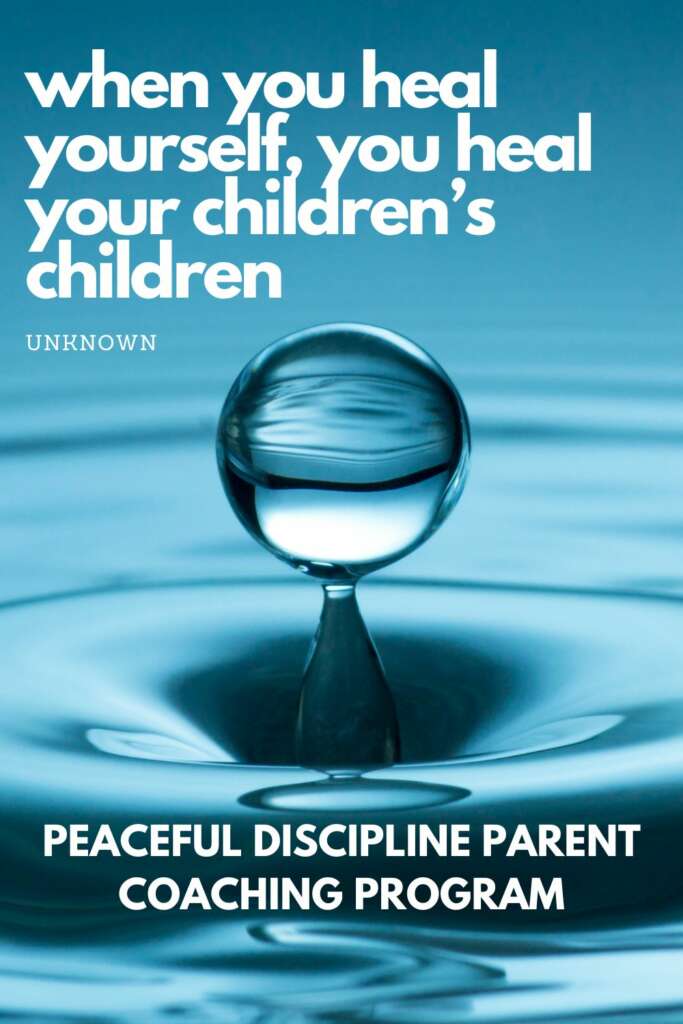
Parent coaching can help us create a better, safer, healthier world for our children, starting within our very own home. It gives us the tools and resources we need to thrive within our family unit.
It can bring our families more peace, joy, and connection. Whether we intend to or not, these gifts ripple throughout our communities and to all the lives we touch.
Parent coaching is here to empower you and your family, providing the support and strategies you need to overcome obstacles. It can help you flourish together.
Sarah R. Moore of Dandelion Seeds Positive Parenting and the American Society for the Positive Care of Children (American SPCC) are launching incredible new parent coaching services, called the Peaceful Discipline parent coaching program. They'll give you practical strategies to help you move from being "stuck" in challenging behaviors to a much healthier place in your communication patterns with your family.
Aside from addressing challenging situations, these parent coaching sessions can also help already-close relationships get that much closer, if you simply want to hone your skills further.
Many aspects of this parent coaching program are truly world-class and offer benefits that no other group coaching plan that we know of can offer.
Examples:
The depth of your trainer's expertise is diverse and exceptional; she truly "gets" more sides of the parenting journey than most others do. She won't just teach you parenting skills to address your child's behavioral challenges; what makes her parent coaching sessions successful is her ability to see behind the parent's behavior. Don't just take our word for it, though. Below, you'll find testimonials from some of her former students.
Every week, you'll have access to pre-recorded interviews with some of the world's most highly sought after experts in child development, neuroscience, behavioral challenges, and personal growth. These alone are a game-changer. You'll find more details in the syllabus, below.
These interviews aren't just generic YouTube videos from parent coaches that anyone can access. Your trainer interviewed each of these experts individually with specific questions in mind to "level up" the parent coaching that's available elsewhere.
Specifically, our goal is to help you feel more peace, joy, and connection with your children as you progress through our parent coaching program--and for many years thereafter. Here's how:
Unlike many other programs, this parent coaching program will support parents in these ways:
Peace
Parent coaching can help a parent or caregiver not only grow their skillset, but also increase their confidence. When you feel more empowered and more confident, you spend less time second guessing your parenting decisions for your kids -- and less time feeling the need to justify your parenting to others. You'll have the education to bring you more peace in your daily life. Moreover, when you feel more peaceful on the inside, you have more peace to share with those around you.
Joy
As a society, we're facing an incredible mental health crisis. Being intentional about creating more joy in your family is a powerful elixir to combat the challenges we face on a daily basis. You'll come away with some specific tools you can use regularly to feel less stress, and more joy, in your heart.
Connection
Rather than a chronic feeling of disconnection with your family, you're likely to "see" each other in a whole new way after this parent coaching program. You'll have the skills you need to feel like a more cohesive family unit.
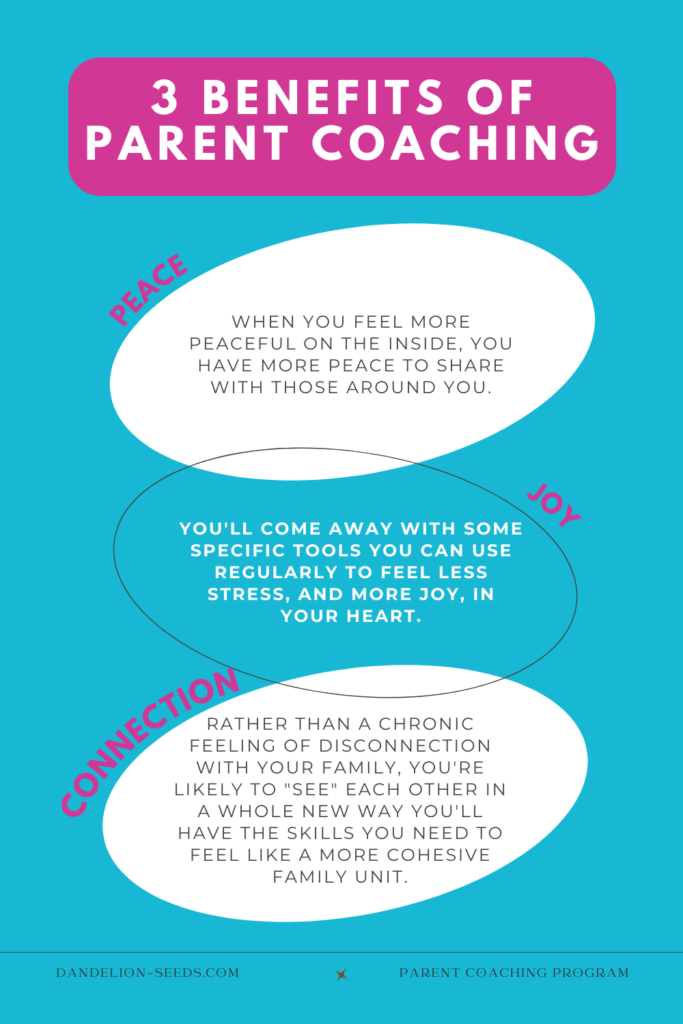
For 12 weeks, you'll meet in an online group setting once per week in a live Zoom class with your trainer. You'll be assigned 1-2 hours of homework to complete outside of class so that you're prepared for the following week's meeting. Rather than "homework," however, we prefer to call it "growth work." You don't turn it in for a letter grade (it's not like school). The work is for your benefit to help enhance your parenting techniques and increase your confidence as a parent or caregiver.
If you don't finish your growth work prior to the class, please come anyway. You're always welcome just as you are.
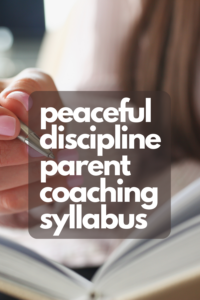
For each of the 12 weeks we meet, we will have at least one expert guest speaker via prerecorded video on the topic that we're covering, all within the framework of respectful, connection-based conscious parenting. You do not need to watch all these videos. Specific instructions will be given before each class. Typically, you'll have one assigned video and/or one optional video to watch, along with the other growth work. Here are some of the experts from whom you might hear on each topic (subject to change).
Week 1: Welcome & intros, knowing our “stories,” reparenting ourselves, and becoming the parent we WANT to be.
Expert videos:
Jessica Joelle Alexander, co-author of "The Danish Way of Parenting" on the basics of respectful parenting; Dr. Sarah Bren on the importance of "good enough" parenting"; Donna Tetrault, author of "The CASTLE Method" on raising emotionally healthy families; Dr. Lynyetta Willis on family of origin; Shelly Robinson, founder of Raising Yourself on re-parenting ourselves; Dr. Robyn Koslowitz on parenting after trauma
Week 2: What's developmentally normal? Supporting wherever your child "should" be.
Expert videos: Dr. Tina Payne Bryson, co-author of "The Whole-Brain Child," "The Bottom Line for Baby," and other books -- on making evidence-based choices for your baby; Dr. Laura Markham, author of "Peaceful Parent, Happy Child" and "Peaceful Parent, Happy Siblings" -- on navigating sibling relationships across different life stages; Debbie Reber, author of "Differently Wired" on neurodiversity; Dr. Ann-Louise Lockhart on highly sensitive children; Phyllis Fagell, author of "Middle School Matters" and "Middle School Superpowers" -- on the middle school years; Luis Fernando Llosa, co-author of "Emotionally Resilient Tweens and Teens" -- on supporting these young adults; Julie Lythcott-Haims, author of "Your Turn: How to Be an Adult" and other books -- on preparing our children to launch
Week 3: Understanding your nervous system, your reactions, and your triggers – setting your brain & body up to help you.
Expert videos: Dr. Stephen Porges, author of "The Polyvagal Theory"; Dr. Mona Delahooke, author of "Beyond Behaviors" and "Brain-Body Parenting"; Maggie Viers, founder of The Empowered Family
Week 4: Yelling less, connecting more: releasing healthy anger without shame -- and supporting your children in their anger, too.
Expert videos: Dr. Ross Greene, author of "The Explosive Child"; Robyn Gobbel, author of "Raising Kids with Big Baffling Behaviors"
Week 5: Unpacking boundaries, punishment and “consequences” – what the research says about effective discipline.
Expert videos: Katherine Reynolds-Lewis, author of "The Good News about Bad Behavior"; Iris Chen, author of "Untigering"; DJ Johnson, motivational speaker; Mr. Chazz
Week 6: It’s never too late to heal (or too early).
Expert videos: Dr. Daniel J. Siegel, co-author of "The Whole-Brain Child," "Parenting from the Inside Out," and many other books; Eli Harwood, author of "Securely Attached" and founder of Attachment Nerd; Bethany Saltman, author of "The Strange Situation"
Week 7: Understanding what actually drives children’s independence and skill-building.
Expert video: Dr. Vanessa Lapointe, author of "Parenting Right from the Start" and "Discipline without Damage"
Week 8: Raising resilient children: emotion coaching, big feelings, and personal growth.
Expert videos: Dr. Michele Borba, author of "Thrivers" and many other books; Dr. Anne Lane, author of "Nurture Your Child's Emotional Intelligence"; Dr. Robert Brooks and Dr. Samuel Goldstein, authors of "Tenacity in Children: Nurturing the Seven Instincts for Lifetime Success"; Dr. Bill Stixrud and Ned Johnson, co-authors of "The Self-Driven Child" and "What Do You Say?: How to Talk with Kids to Build Motivation, Stress Tolerance, and a Happy Home"
Week 9: The importance of showing up for yourself: how to feel heard, validated, and supported in your parenting.
Expert video: Caroline Welch of the Mindsight Institute and author of "The Gift of Presence"
Week 10: Using improv, play, and stories as teaching tools.
Expert videos: Dr. Larry Cohen, author of "Playful Parenting"; Vivek Patel of Meaningful Ideas; Andrew Newman of Conscious Stories
Week 11: The importance of simplifying childhood.
Expert videos: Kim John Payne, author of "Simplicity Parenting" and other books; Dr. Meghan Owenz, author of "Spoiled Right: Delaying Screens and Giving Children What They Really Need"
Week 12: Evidence-based physical and mental health strategies.
Expert videos: Dr. Elisa Song, founder of Healthy Kids Happy Kids; Dr. Nicole Beurkens, author of "Life Will Get Better"; Jennifer Anderson, founder of Kids Eat in Color; Tessa Stuckey, LPC, author of "For the Sake of Our Youth"; Janine Halloran, founder of Coping Skills for Kids; Jess Lahey, author of "The Addiction Inoculation" and "The Gift of Failure"; Konika Ray Wong, founder of Girl Power Science; Seth Perler, executive functioning specialist; Dr. Rocio Zunini, neuroscientist & infant sleep expert
Bonus week (optional): Support for educators.
Expert videos: Dr. Jamie Chaves & Dr. Ashley Taylor, authors of "The Why Behind Classroom Behaviors"; Annie Murphy Paul, author of "The Extended Mind"; Dr. Peter Gray

Yes. The American SPCC has accredited Sarah's program so you can be sure everything you learn is evidence-based, effective, and applicable to a wide range of parenting and education scenarios.
Both the American SPCC and Sarah R. Moore are committed to making the world a safer and more loving place for children. We are committed to changing the world for the better, starting with the way children experience safety and well-being at home--with the understanding that they'll "pay forward" to the world what they've experienced firsthand.
Sarah R. Moore is the author of Peaceful Discipline: Story Teaching, Brain Science & Better Behavior and founder of Dandelion Seeds Positive Parenting. As a certified Master Trainer in conscious parenting and Board Member for the American Society for the Positive Care of Children (American SPCC), she’s also a public speaker, armchair neuroscientist, and most importantly, a Mama.
Her work has been featured on NBC, CBS, and SiriusXM. She's also been featured in countless podcasts, parenting summits, and in print publications (HuffPost, The Natural Parent Magazine, Green Child Magazine, Yahoo!, Motherly, Scary Mommy, and many others).
With training in child development, trauma recovery, interpersonal neurobiology, improv comedy and play, her work supports parents and caregivers around the globe. Follow her on Instagram, Facebook, YouTube, TikTok, Pinterest & Threads.

Sarah has trained hundreds of people in parent coaching, including:
biological parents, grandparents, and great-grandparents
adoptive parents
foster parents
expectant and new parents
parents of young children, tweens, teens, and young adults
parents of children who've long since left home
current parent coaches
social media influencers
educators
therapists
medical doctors
And many others--from novices to experts in the field of child development.
The American SPCC's vision statement summarizes their work well: "American SPCC is dedicated to being part of the solution by offering life-changing education and support to caregivers. When caregivers are empowered with the knowledge that even small actions can have significant impacts on a child’s development, we can ultimately break the cycle of trauma before it’s passed down.
We also know the struggles of parenthood look different for every family. That’s why we offer support by meeting caregivers where they are at, without judgment or expectations. We recognize parenthood is difficult, especially when combined with hardships related to relationships, employment, mental health, physical health and more."

"I had the privilege of being coached by Sarah, and I cannot express how much my personal and professional life was impacted by her wisdom, guidance, and expert coaching. Her compassionate and empowering coaching techniques allowed me to tap into my own inherent wisdom, helping me to feel safe, supported, and seen. Not only did I walk away from my coaching engagement with Sarah with practical parenting strategies and tools to use in my daily life, but I also concluded my experience with so much more self-compassion, something Sarah helps all parents cultivate. Sarah is truly a master at what she does and I absolutely recommend working with her if you're looking for support, guidance, and encouragement on your conscious parenting journey." - Shelly Robinson, founder of Raising Yourself
"I've known Sarah for a few years now. I've had the good fortune of being coached by her and I can tell you that yes her wisdom and knowledge on the subject matter is phenomenal. You can see her passion and witness her expertise. At the same time there is something very comforting about her presence, the way she holds space for you without any judgment and with so much compassion and solidarity. She has a way to put you at instant ease with her so much warmth that you can feel it radiate even though you aren't in the same room as her ( not the same hemisphere in my case ! ) Her kind guidance has made such a huge impact on our family and I'm so grateful for the wonderful human that you are." - Dilshad, founder of The Gentle Mamma
"Sarah is truly a gift! I had the joy of taking one of her classes and I looked forward to her presence every week. As a coach and educator she is the embodiment of kindness, empathy, knowledge, and support. I feel very lucky to have learned from Sarah and I have all the confidence that her new program will be as remarkable as all the work she’s put forth leading up to this exciting new project. Thank you for all I’ve learned and continue to learn from you, Sarah." -Haley Turner, Sweet Home Parenting
"Working with Sarah is the best investment I’ve ever made for me, for my family, and for my approach to life. Her kindness and authenticity will change your life for the better, too." - Katherine Tasheff
"Working with Sarah R. Moore has been transformative for me as a parent coach. Her unparalleled expertise and coaching skills have not only deepened my understanding of effective coaching strategies but have also empowered me to create meaningful and lasting change in the lives of the families I work with. I am grateful for her guidance and support as it has helped me empower parents with confidence." - Candice Cochrane, Parents of Presence
"I am incredibly grateful for Sarah’s guidance as a parent coach. Her unwavering empathy and compassion created a safe space where I’ve learned to navigate the complexities of motherhood. Sarah’s insights have not only transformed my approach to parenting but have also positively impacted countless others like me. Her commitment to fostering conscious parenting is truly inspiring." - Jaymie of MyMumDiaries
"I had the pleasure of working with Sarah as my coach and trainer. Never having met her, I immediately felt her warmth and caring nature even over the computer screen. She made me feel safe, heard and seen. I was able to open up to Sarah about things that were very uncomfortable, and she always held such a supportive space for me to express my feelings. Sarah guided me and gave me the confidence to use my voice in not only my personal life, but my professional life as well. I am forever grateful to have Sarah in my life." - Katie Mae Ramirez Parent Coaching
"Sarah Moore is an answer to a desperate prayer. My wife and I were incredibly frustrated with how our life as parents was going, especially with our youngest son. Neither spanking nor timeouts worked, and we were left wondering if there was some better way to parent. After some time, I made the decision to go through training to become a peaceful parenting coach. Sarah was my trainer in the program. Week by week, I found myself growing in my ability to calm myself down and to be predictably calm for my sons. Sarah’s genuine care for our cohort members, her skill and insight, and her relational warmth made it possible for me to transform as a parent AND to develop my own parent coaching practice. Sarah’s book as well as her social media posts keep the parenting inspiration and motivation going. I am a huge fan and cheerleader of and a friend to Sarah R. Moore! Thank you so much for your work! - Brandon Miller, Confluence Parenting
"Sarah has left a lasting and wonderful impression on me both in my parenting and my coaching. She is kind, empathetic and extremely knowledgable, and knows exactly how to explain something to make it fully relatable. It was such a pleasure to be trained by her and I hope our paths cross many more times!" - Sarah D.
Although valued at more than $8000, the one-time introductory rate for group parent coaching is $1200 USD, payable in full before your first session begins.
Many parenting summits are several hundred dollars, without any personalized support. Many professional coaches and therapists charge upwards of several hundred dollars per hour.
If you take this $1200 and divide it among 12 weeks of live group coaching, and the expert interviews to which you'll have full access, and the priceless and positive changes you're likely to see in your family, this may be the best investment you'll ever make--especially at this introductory rate.
 How do I sign up?
How do I sign up?Before you officially enroll, we will ask you to fill out an application to make sure it's a good fit for you as well as for us. We want to make sure you're clear that parent coaching doesn't just "fix your kids' behavior." In fact, it's often the caregiver who needs the right tools to meet the child wherever they are developmentally. The services we offer are parent-centric, to help you develop the skills you need to be peaceful, patient, and present with the children in your life.
Parent coaching services are designed to help families navigate the complexities of raising children in today’s world. Partnering with a parent coach provides access to abundant knowledge and resources tailored to unique parenting challenges. Parent coaching is centered around building stronger relationships within the family and nurturing positive behaviors in children.
With the help of a dedicated parent coaching session, you’ll learn new skills and strategies to become a better parent, empowering you to teach your children more effectively. Recognizing each family’s uniqueness, with its own strengths and challenges, is a fundamental aspect of parent coaching. Parent coaching, with its focus on the present moment and a collaborative approach, enables parents to acquire the skills necessary to handle their child’s behavior, and uncover the root causes of their own behavior, as well.

What parent coaching isn't
Parent coaching services aren't therapy. Also, they aren't designed to support underlying mental health issues. Although certainly not all parents do this, many choose to couple therapy with the skills and techniques they're learning in our course.
Although we can't speak to or guarantee individual outcomes, we do know from our experience that in many cases, once children feel their caregivers' emotional attunement and skillset increasing, better behavior is often a natural byproduct of that. Many parenting challenges often melt away.
Also keep in mind that we use a parent-centric approach to parent coaching, so rather than a focus on behaviorism (only changing our kids' behavior), we focus on ourselves--the adults--with a whole family perspective. We know that the only behavior we can control is our own, so we empower you to optimize your own ability to be a good parent that's responsive, compassionate, and who has developmentally appropriate expectations of your child.
Parent coaching extends beyond addressing challenging child behavior; it also involves fostering positive ones. Through parent coaching sessions, parents learn evidence-based strategies and practical tools to encourage positive behaviors in their children.
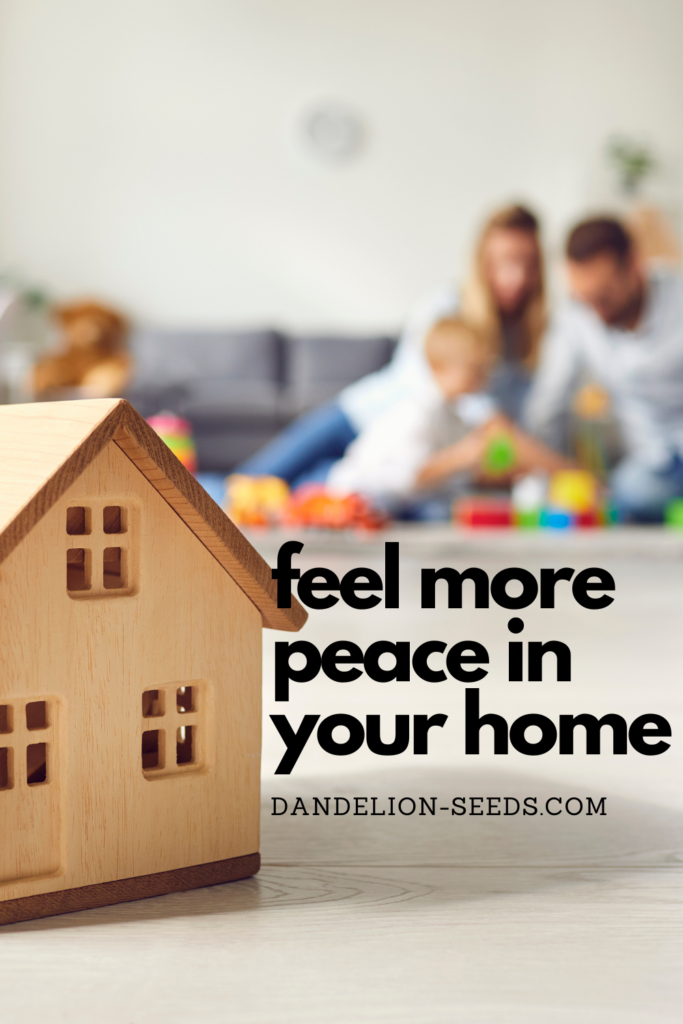
Although this program will certainly empower you to help others and touch lives in ways you may have never dreamed possible, this program is for your own personal growth, not to pass along coaching services to others. If you're looking for more, please discuss that directly with your trainer.
As parent coaches, we are trauma aware and work to take a sensitive approach to whatever our clients have experienced. Although we are not a trauma recovery program, several of our experts address these topics we cover from a trauma informed perspective.
At the core of parent coaching is the goal of fostering healthy, secure, and nurturing parent-child relationships. Building these connections requires effective communication and teaching children essential life skills. By learning active listening, understanding what boundaries really mean, and prioritizing connection over blind compliance, parents can create an environment where children feel heard and supported. As a result, children can develop a sense of trust and ultimately, a foundation for emotional well-being.
Parent coaching also recognizes the unique role that biological, adoptive, foster parent, and kinship parents play in reversing the harm inflicted on children who have endured abuse, neglect, or abandonment. By employing adaptive communication techniques, parent coaching can help parents navigate these sensitive issues and foster healing within the family.
Parent coaching is adaptable, supporting a broad range of family needs. Single parents can benefit from the personalized guidance and resources provided through parent coaching, helping them navigate the unique challenges of raising a child on their own. Parenting coaches also offer valuable support to blended families, providing strategies and tips to foster a loving and harmonious environment, promoting effective communication and conflict resolution.
Families with special needs children, including autism spectrum disorder, can find invaluable support and guidance through parent coaching, as it equips parents with effective parenting skills, improves communication and advocacy, and encourages self-care and well-being. Furthermore, parent coaching can support families facing a wide variety of challenges, providing tools and strategies to address these issues and foster a nurturing, supportive environment for all family members.
If you're raising a young person who's strong willed, it can certainly be challenging. This type of child's powerful will can seem to overpower the energy of a room with their determined nature to get their way.
There may be more going on for people--especially children--when they seem strong willed, however. It's often a mask for something else.
There are many synonyms for a strong willed person of any age, including kids--and most aren't particularly flattering. Here are several examples:
Stubborn
Headstrong
Obstinate
Combattive
Resolute
There are more synonyms of being strong willed, of course, but you get the gist.

As humans, our brains seek something called confirmation bias, which means "...the tendency to search for, interpret, favor, and recall information in a way that confirms or supports one's prior beliefs or values." (source)
In other words, if we think our of someone as being strong willed, confirmation bias tells us with every hint of pushback that we were right about our belief, even if there's more going on beneath the surface. However, that's not always what's really happening.
The way we view kids matters, and the paradigm shift to make parenting easier is to realize kids are doing the best they can with the physical and emotional skills they've learned so far. It takes 25-30 years for kids' brains to fully develop, so it behooves us to look for the good in what they've learned and the behavior they're exhibiting.
Related post: When Does Parenting Get Easier?
Strong willed kids need these two things from their parents every day:
Permission to express themselves and be fully heard, without us interrupting or telling them why they "must" do what we say. Often, the child's perspective is that we--the adult--are the one who's strong willed. When we soften and get curious about what they're trying to communicate, they often soften in return. We need to focus less on being "right" and, instead, on being a safe emotional place for them to express themselves. Over time and by us modeling effective communication, they'll learn.
If we see them as "talking back," we can reframe it as "they're learning to stand up for themselves." That's a good and healthy life skill that we can navigate with compassion. Here's how.
Extra gentleness. Beneath the surface of the strong willed child's demeanor is often a deeply sensitive soul who's simply put on "armor" of appearing strong when, in reality, they need someone who deeply strives to understand their needs and help them feel less overwhelmed by the world.
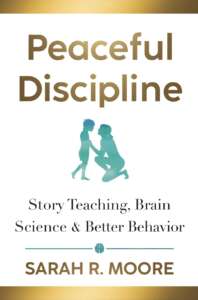
Strong willed children are often the ones who, provided they're not "squashed" by those who overpower them emotionally, grow up to have incredible drive, emotional strength, and resilience.
Most of all, when problems arise, remember that it's not you versus your child in a battle of strong wills. Instead, it's you alongside them against whatever problem you're trying to solve together.
I was well into adulthood and fairly new to parenting when I realized how complicated my family of origin was. Growing up, I knew that my formative years didn't comprise what many would call a picture-perfect "healthy family environment"--after all, my father lived clear across the country and was struggling on many levels, and my mother, while doing her best for me, was still unpacking her own challenges.
I didn't know about ACE scores or trauma back then, but as early as age six, when my mother told me she and my father were getting divorced, my gut reaction was, "Oh, thank goodness. Life will feel more peaceful now."
I'm told this isn't a typical reaction from a six-year-old child. I didn't get the memo that I was supposed to mourn this announcement.
Although my parents had worked to avoid divorce by going to family therapy and whatnot, there are certain dynamics that are so fraught with negative patterns and chronic poor choices that recovery simply isn't possible. Already at six, I understood the gist of this.
As I grew older, I joked, albeit secretly hoping it was true, that I'd have no trouble in my future romantic relationships or parenting because I'd had such good models of what not to do.
I was wrong, of course.
My family of origin issues did not prepare me for a peaceful family life of my own, much less any understanding of what a healthy family environment should resemble. My emotional health suffered for a good long while, while I stumbled around wondering why I kept getting relationships so wrong.
To be fair, my family of origin wasn't entirely to blame. My biological parents have both given me loving support in various ways throughout my life, so it's never been a "black and white" situation.
One change I finally made to break that pattern--the one some call "cycle breaking"--was consciously exploring the negative aspects of my parents' relationship and how they parented me--and learning how to do things differently.
I learned that conscious parenting matters. A lot.
I wouldn't settle anymore for repeating what was familiar. Instead, I took the driver's seat of my own mental health--and knew I wanted better for my daughter's childhood, too.
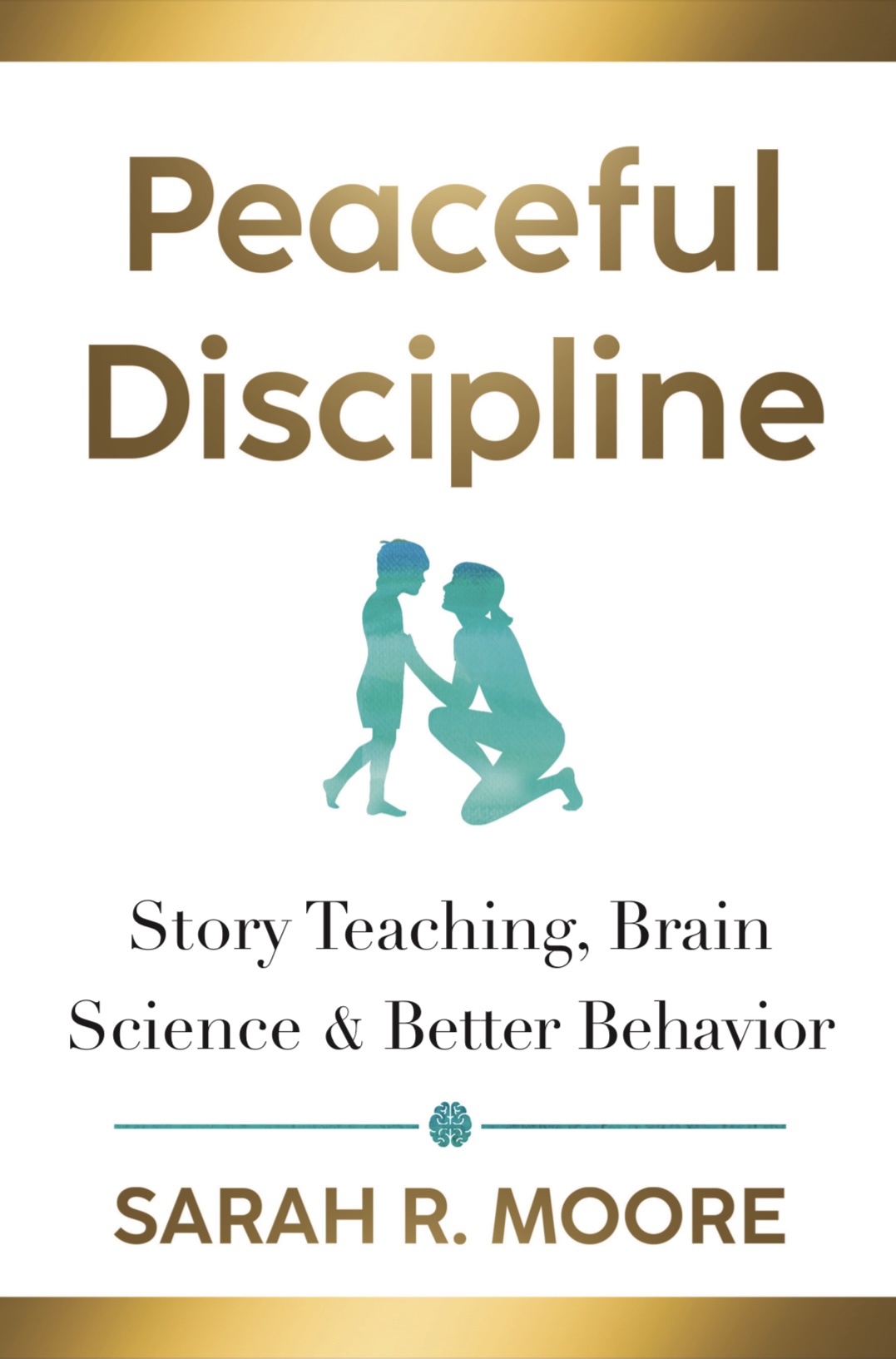
Although my biological family of origin would lay the groundwork for how I'd handle some things (epigenetics and intergenerational trauma are real), their history didn't need to become my destiny.
I also know I'm not alone in having a tricky family of origin.
Tackling family of origin issues doesn't happen overnight. There's no "quick fix" for the family dynamics and belief systems we carry forward into our relationships before we even realize we're doing it.
We have to work hard to disrupt family patterns that aren't serving us anymore. We can't do this work alone.
Here are three approaches that can prove immensely helpful in recovering from a suboptimal family or origin and bring you back to a place of greater mental health--and a closer, more emotionally healthy family.
Talk therapy, along with a combination of non-traditional therapy options, can be helpful to treat body, mind, and spirit. Talk therapy, specifically, is found to be helpful in three out of four people, or 75% of people who seek to improve their relationships this way (source).
If we want to heal, we have to intentionally address the messiness we brought into parenting, whether or not we realized we were bringing it.
We need to form a coherent narrative about our childhood, and see how the beliefs we learned growing up are still serving our self-esteem and feelings of "wholeness" in adulthood.As for non-traditional therapy to help family of origin relationships or personal healing, there are many possible helpful modalities, including EMDR, somatic therapy, and others.
"...EMDR (Eye Movement Desensitization and Reprocessing) is a psychotherapy that enables people to heal from the symptoms and emotional distress that are the result of disturbing life experiences. Repeated studies show that by using EMDR therapy people can experience the benefits of psychotherapy that once took years to make a difference. It is widely assumed that severe emotional pain requires a long time to heal. EMDR therapy shows that the mind can in fact heal from psychological trauma much as the body recovers from physical trauma..." (source)
Somatic approaches also help address mental health concerns from the inside out (source).
Additionally, one of the most important things you can do is reparent yourself. When you do this alongside the work you seek with a therapist, you may discover a real sense of inner safety, perhaps for the very first time in your life.
Whether a person's biological family or adoptive family of origin is at the root of our childhood struggles, we must create and maintain healthy boundaries with them.
They don't get to tell us how to parent our children. Perhaps of even greater importance, we don't need to let the voices they "planted" in our heads during our own childhood tell us how to parent our children. When we hear those voices, we get to push back on them.
Our boundaries may or may not match whatever boundaries our siblings have with our mother and father; they have their own relationships with them. It's their life. We must realize that for our own mental health, we can't concern ourselves with what others feel is "appropriate" for us or for our children--this is our life and this is our very own parenting journey.
If we weren't raised with peaceful discipline, we get to give that gift to our children. When we do this, they won't have to heal from their childhood like we did.
We also get to rewrite our story about our own childhood. We can develop whatever boundaries we need to manage conflict and find emotional safety for ourselves and for our children.
We need to examine which childhood wounds need fixing. Once we do that, of course, we want to be careful not to shame our parents, or in most cases, exclusively blame one parent or the other.
A blaming mindset leads us to parent from our own anger and resentment, rather than from a place of peace. That serves neither our relationships with our parents or with our own children. More effective is to find a way to make peace with our past, whatever our narrative about our family of origin may be.
To clarify, this does NOT mean we need to approve of how our parents or extended family of origin treated us. It's a different kind of forgiveness we seek; one that frees our heart from carrying our pain forward.
We can choose to see our feelings about our family of origin as messengers about what we need going forward, rather than what we lost when we look backwards.
Most importantly, if our family of origin choses to perpetuate unhealthy patterns, especially in front of our own children, we can choose to no longer be a party to it.
We want our own children to have a strong sense of what healthy families look like, and realize we are the ones who need to model that, including setting clear boundaries with some of the people we love (or once did).
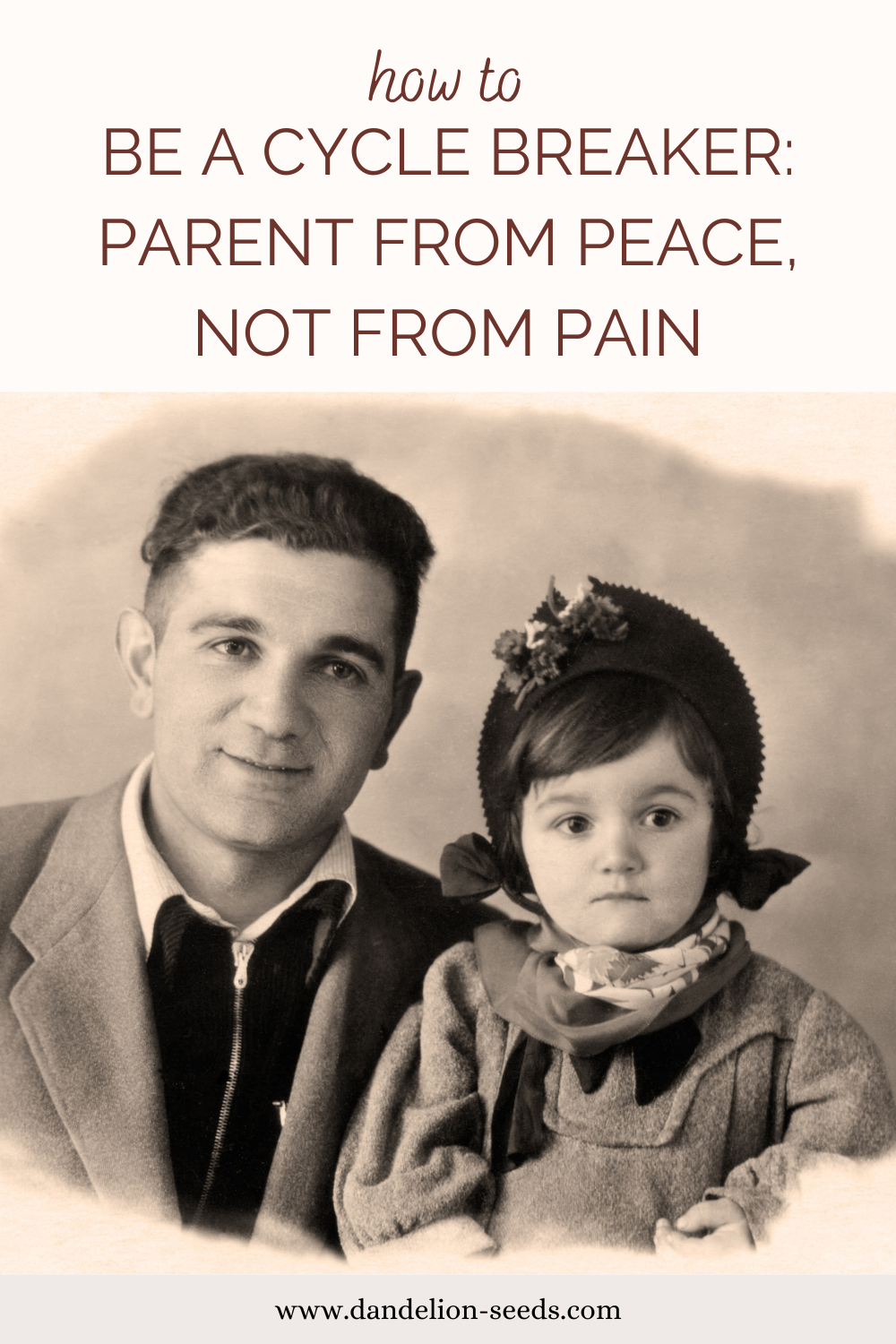
Once you begin your healing journey, it can be tempting to dig so deep into your past that you lose sight of your present.
You might embark on an extensive study of family issues; everything from dependence disorders, emotional abuse, trauma recovery--you name it. Maybe it all serves you well.
Or, maybe you benefit only from one piece of it, and the rest stands to do little more than overwhelm you.
You can't study everything at once, lest you become emotionally and intellectually flooded.
In bite-sized pieces, though, you can learn what works for people.
Outside an "academic analysis" of your childhood and all the factors that contributed to where you are today, one more straightforward approach is to find role models for healthy relationships outside your family of origin.
Pay attention to communication patterns of people who you know are happily partnered and/or peacefully parenting, creating a home that thrives on mutual respect. People often default to their biological family for who they model, but we can and should look beyond our own family of origin here.
We can absolutely create a "chosen" family, whether we know who that is during our formative years or whether we choose our people in adulthood. All healing counts.
Family members may directly or indirectly oppose our work to change things up; to do things differently than they did. They may view our emotional work as a direct hit to their self-esteem. They may take it personally, because let's face it, it is personal.
And yet, if we're going to provide children with a roadmap of how to do life, we need to press forward without worrying about whether our family of origin "approves" of our need to heal. We're not just healing our own relationships; we're proactively healing those that our children will have someday.
Our children will be prone to fewer mental health issues if they grow up modeling healthy families in their romantic relationships, friendships, and in their own parenting someday.
It doesn't matter whether your family members are on board, or whether they believe you "need" any help. You know what feels right and what seems to be moving the needle in the right direction, so it's exclusively your choice to pursue healing without doubt or fear of judgment.
If it's healing and important to you, doing your family of origin work can be non-negotiable, regardless of what your parents, siblings, or anyone else says about it.
Perhaps the most important part of healing family of origin issues is redefining what it means to heal. It's tempting to hold a sort of black and white view of the family unit: beliefs that a family is either "healthy" or "broken."
The truth is, we're all somewhere in-between. Every step we take towards having an emotionally safe family of our own is a true and worthy accomplishment.
Will we ever achieve perfection, though? Will we find that perfect fit of a puzzle-piece scenario where the entire family relationship just works as intended, every moment of every day?
I doubt it. And I'm an optimist.
I believe that healthy families are, perhaps surprisingly to my younger self, still messy sometimes.
Emotional well-being shows up somewhere on a spectrum, rather than being an absolute. Family of origin issues still come up, because we have that history. Our trauma and core beliefs don't just disappear into thin air when we decide to heal. It's an evolution that takes time and effort.
The big shift for healthy families, however, is when our family of origin issues don't determine the outcome of every struggle. We get to choose a new path forward. A healthier one.
We've grown wise enough to view our history as a single piece of that puzzle, but we now have more tools at our disposal. More information. We learn more ways to show up for ourselves and one another. We learn strategies that enhance our relationships rather than harm them.
Healthy families develop ways to be present for each other through the gift of emotional safety. Difficulties no longer set us back; instead, whether in marriage or friendships or raising children, we deeply believe that healing is always possible.
Because it is.
My six-year-old self didn't know how things would turn out, but she was right about one thing: life feels more peaceful now.
When people say it's important to "reparent yourself," they're referring to your ability to show up for yourself in the ways you always needed, but perhaps didn't receive from your family of origin.
It's not that everyone was raised without healthy relationships. Many people were raised by loving families (or at least one emotionally healthy adult), where they learned their feelings matter. Perhaps they learned effective communication skills early on, and had few to no issues with self-esteem.
Maybe they learned how to resolve conflicts and overcome setbacks with the loving support of their parents, and their parents also modeled how to show up without neglecting their own needs.
For many of us, though, our own parents' emotional skills, mental health, parenting skills, or general capacity to support us may not have been all we'd hoped for.
And let's be honest.
This grief is real and valid.
We can't sweep it under the rug if we want to move forward with the life skills that will serve us better in the future. We need to allow that grief and process it fully.
At the same time, let me reassure you: healing is possible.
Although I wish I could offer you a sure-fire way to directly heal your childhood self, what I can do is offer you some extremely practical suggestions while you're learning how to reparent yourself.
I'll also be transparent about this, though--free self-help articles usually aren't enough. A trained therapist treats issues like these better than an article on the Internet ever could. (I assure you, though, as a conscious parenting educator and author who works with families all over the world, I do have firsthand experience with this).
My hope is that, in tandem with whatever support you're receiving from compassionate caretakers, this article will at least be a starting point for you.
Here are some ways you can begin the work to reparent yourself.
Many of us who had a "suboptimal" or dysfunctional family of origin may believe our struggles are somehow all our fault. This is often the case for kids who were forced to grow up too soon. Perhaps we were the mature or responsible one in our family, even more than our parents.
We might "know better" intellectually, but somewhere deep down, our younger self may still feel partially responsible for the grief we're holding.
We may believe that we could've or should've done something differently when we were kids. Perhaps we had no real role models, but somehow we still learned to expect perfection of ourselves.
This would've been impossible to accomplish, of course. If no one showed us how to effectively navigate life's ups and downs, we likely ended up setting idealistic goals for ourselves with no roadmap of how to achieve them.
Stuffing down our pain doesn't get us far (and in fact, it likely sets us back).
Many of us claim we "turned out fine," but that statement is only a mask that our younger self wore as a facade for self-confidence.
When we're brave enough to accept all our feelings, our life satisfaction tends to go up, and we realize that the one who models acceptance best is our own self.
Self-acceptance means we can invite our inner child into the discussion, realize what emotional skills we needed most when we were growing up, and learn them now.
With self-compassion, we can feel what we need to feel, and heal what we need to heal.
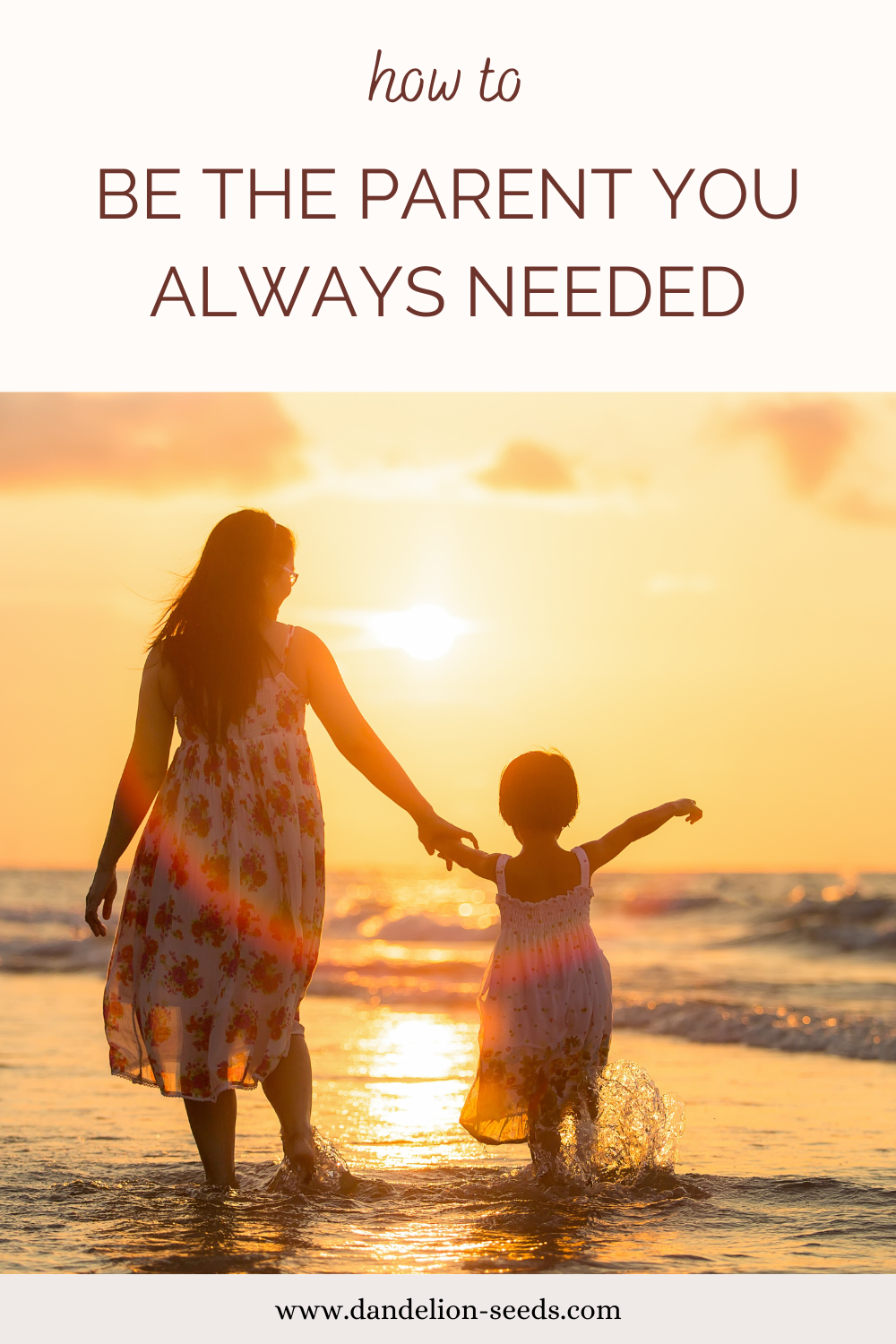
There are so many other adults who sincerely crave deep, healthy relationships with others. With you.
Truly unconditional love, unlike that which you knew growing up, might be just at your doorstep--if you're emotionally ready to receive it. When you let yourself heal, you make room for healthy relationships.
We may need the support of a trained therapist to help us avoid repeating the cycle of choosing a support network that mimics our family of origin (and therefore, offers no respite from the patterns we're trying to heal).
We may need to develop new emotional skills while we choose a loving relationship (platonic or otherwise) that is actually based on mutual respect, trust, and support for one another's emotional needs.
When we work on creating relationships based on these things, we practice the healthier habits we craved when we were children.
We do this while remembering, of course, that no one handles relationships perfectly all the time, and no one's social-emotional skills are 100% all the time. Still, our adult self can shift the pattern of choosing unhealthy relationships and replacing them with those that reflect our newfound emotional health.
If you want to reparent yourself, you must focus on limiting unhealthy activities and people who only keep your pain alive.
We have limited capacity for relationships (there are only so many hours in the day!), so choose wisely.

Your children depend on you for so much more than just their basic needs. You're modeling healthy relationships, healthy boundaries, and healthy coping skills.
They also need you to model self-care, so they know they're worthy of caring for themselves someday.
Your childhood self heals from each one of those positive interactions.
It's as if "little you" were observing how you treat your children and saying, "Yes! THAT is what I always needed."
When you contribute positively to the emotional health of your children, you reparent yourself by showing that it's possible to have a healthier parent-child dynamic.
You will model how to tolerate unpleasant emotions, embody emotional regulation, and the lead with the social-emotional skills you want them to emulate.
You will show your children how to have a more loving relationship with themselves because you showed them they were worthy of a different, healthier kind of love, first.
Specifically, you won't leave them for so-called "self-soothing," because you've learned that excessive self-soothing can backfire and leave a child feeling self-critical and emotionally distraught.
Instead, you stay with them to co-regulate when they need you, knowing that this may require tremendous growth on your part, but that you create healthier habits as a parent when you do this.
To reparent yourself, you must surround yourself with people who support and encourage you.
You're around yourself more than anyone else, of course.
Different from who you surround yourself with in your social circles, this is how you relate to your own thought patterns.
That means that for true self-care to happen, you need to be really, really kind to yourself. You must pay attention to your inner child and whatever narrative they've carried into adulthood about their worth.
Establish the self-discipline to lovingly correct yourself when you hear negative self-talk, especially if it's self-talk you learned when you were a child.
Many adults have trouble expressing themselves kindly, especially in their own thoughts about themselves--and especially if they were raised in a damaging or punitive home.
The risk we face is turning the punishment we received as kids into self-punishment as we grow older.
We learn more about this in the book Peaceful Discipline:
"...As for kids 'deserving' punishments, it’s interesting to note that children believe they deserve whatever treatment we give them—not because of what they’ve done but because of who they are.
Children often believe that good things happen to good people, and bad things happen to bad people. That’s how it works in the movies they watch, right? The good characters are rewarded, and the bad ones are punished or permanently exiled.
No one goes after the bad characters to remind them they’re still lovable. Therefore, if something bad happens to a child (a punishment), they may think it’s because they are bad and not worthy of acceptance.
We do not want children to carry this belief about their inherent self-worth into adolescence and adulthood..."
Self-compassion involves being kind, understanding, and caring towards yourself. Instead of criticizing or judging yourself, try to approach yourself with a gentle and understanding tone. Speak to yourself with kindness. Give yourself the care and attention you always needed--and still deserve today.
Boundaries are an essential aspect of reparenting yourself. They allow you to set limits and create a sense of safety in your relationships.
When you establish healthy boundaries, you create a sense of control over your life, which is essential for your emotional well-being.

In a recent article about our children pushing boundaries, I examine how recognizing unhealthy relationships related to our boundaries may influence our parenting. Here's an excerpt:
Boundaries if we had authoritarian parents
If we grew up with parents who we "had to obey or else," we may have learned one of two things:
We wrongly believe that we don't get to have boundaries, so we may struggle to stand up for ourselves. How this manifests in parenting is that we may end up being too permissive, especially if children express big feelings when we give a voice to our needs.
The risk: We lose ourselves in the process and likely end up resentful.
The solution: Understand that, as a therapist once told me, "You're allowed to take up space." In other words, you can examine your own needs and be confident that every single one of them is valid. You can stand up for yourself while still raising your children with patience, connection, and compassion.
When you lean into trusting your mind and body, learning how to peacefully express yourself in ways that do no harm, you're modeling for your child the benefits of having boundaries.
Your kids will learn that they don't have to be compliant in order to be valued.
We have boundaries that are too rigid, and we force our children to respect our limits every time, without question.
The risk: We push our children away. Just like if we put too much pressure on a twig, it will break. That's not what we want to do to our relationship with our children.
The solution: We learn that, yes, we can have limits, but the best limits and boundaries are the ones that we co-create with our children. Kids push back less when they feel they've had a say in what we're asking of them (and it also reflects best practices of conscious parenting).
Additionally, here's what often happens to adult children of permissive parents (in other words, parents who rarely, if ever, offered boundaries.
If our parents were permissive, that leaves social-emotional deficits in the now-adult child. If our parents didn't know how to--or chose not to--guide us, we may suffer in the following ways:
We may give ourselves overly harsh criticism, with our inner child believing we didn't deserve guidance
We might suffer in emotional situations that require life skills for which we had no role models
We may be chronic people-pleasers, constantly searching for the validation and presence we always craved from our parents
A word of warning: when you begin to reparent yourself, you may uncover additional deficits in your family of origin.
Although you may already know the obvious areas where they let you down, once you start to heal, you may unearth even more work to be done.
This is normal. Get support if you need it.

Reparenting yourself is a process that takes time and patience. It is important to be kind and understanding towards yourself, and to allow yourself the time and space to heal. Remember that healing is not a linear process, and there absolutely will be ups and downs along the way.
Reparenting yourself is a powerful process that can help you to heal childhood wounds, establish a new internal sense of safety, security, and self-worth, and lead a more fulfilling life. By following these steps, you can learn to be the parent you always wanted, to yourself, and create a new relationship with yourself that is more supportive, loving, and nurturing.
How would you feel if I told you pushing boundaries is developmentally normal for children, and in fact, it's healthy?
I imagine you'd have mixed feelings. That makes sense.
On one hand, we want our kids to develop healthy boundaries of their own, and we're their safe place to practice. On the other hand, we need to have limits sometimes, and having a child push against them can be frustrating.
Here are three ways to make peace with a child who seems to thrive on pushing boundaries.
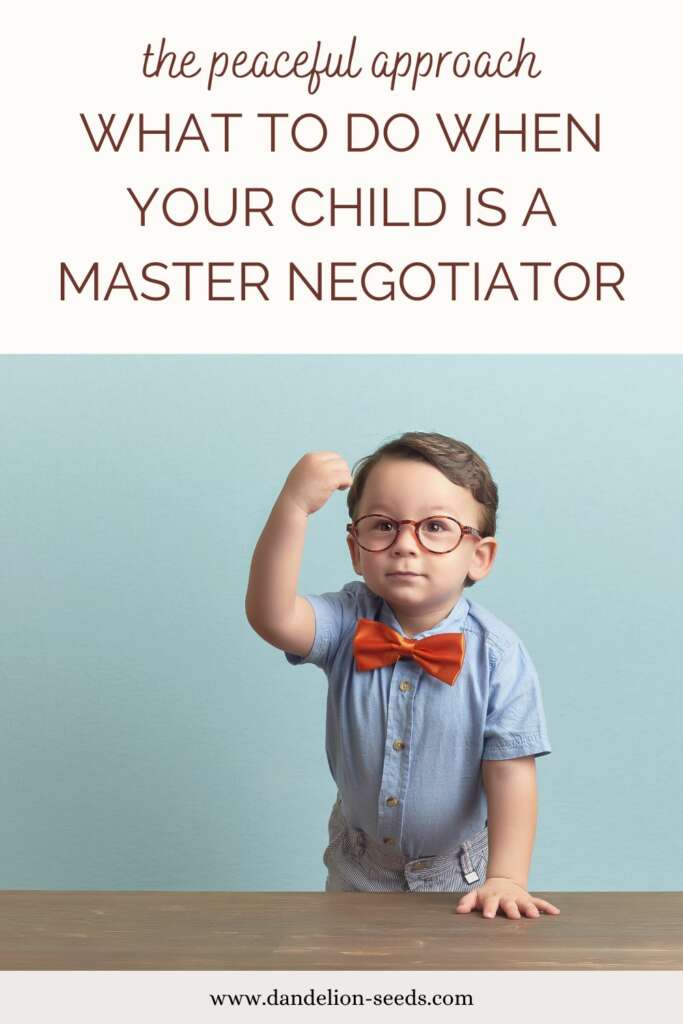
Reality is that as parents, we're role models. Additionally, many of us were raised with an unhealthy view of what boundaries should look like.
If we grew up with parents who we "had to obey or else," we may have learned one of two things:
We wrongly believe that we don't get to have boundaries, so we may struggle to stand up for ourselves. How this manifests in parenting is that we may end up being too permissive, especially if children express big feelings when we give a voice to our needs.
The risk: We lose ourselves in the process and likely end up resentful.
The solution: Understand that, as a therapist once told me, "You're allowed to take up space." In other words, you can examine your own needs and be confident that every single one of them is valid. You can stand up for yourself while still raising your children with patience, connection, and compassion.
When you lean into trusting your mind and body, learning how to peacefully express yourself in ways that do no harm, you're modeling for your child the benefits of having boundaries.
Your kids will learn that they don't have to be compliant in order to be valued.
We have boundaries that are too rigid, and we force our children to respect our limits every time, without question.
The risk: We push our children away. Just like if we put too much pressure on a twig, it will break. That's not what we want to do to our relationship with our children.
The solution: We learn that, yes, we can have limits, but the best limits and boundaries are the ones that we co-create with our children. Kids push back less when they feel they've had a say in what we're asking of them (and it also reflects best practices of conscious parenting).
Here's a video about co-creating goals and boundaries with our children.
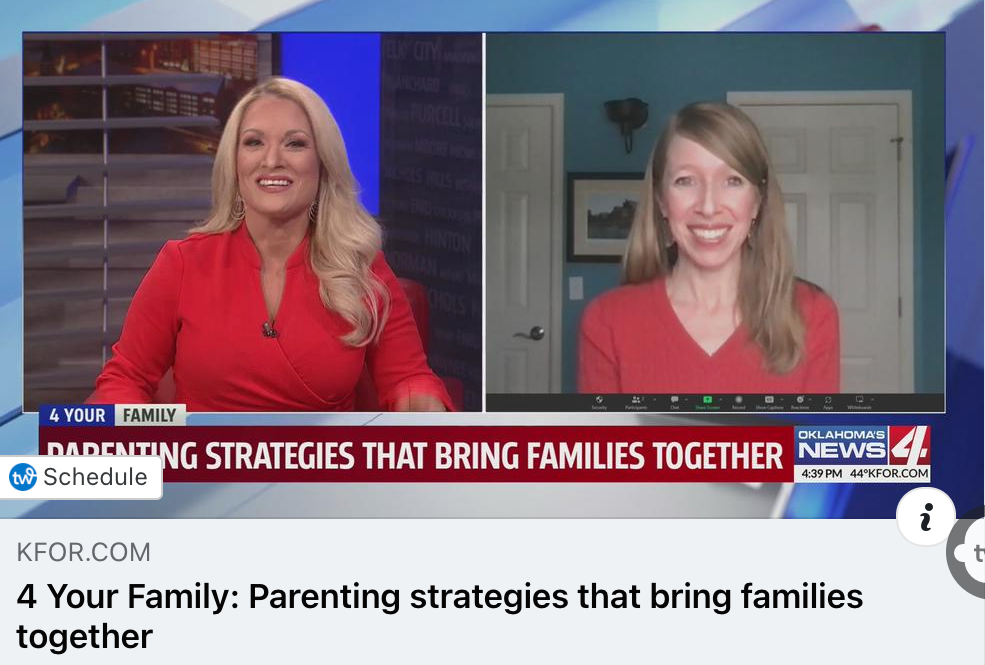
When we learn to parent peacefully, it's amazing how much less backtalk we feel from our children, and how we work to understand what's going on beneath their behavior.
If we weren't raised this way, it can be triggering while we work to stay grounded. Remember that we're changing because the status quo isn't working, and growth can feel messy. It's an investment in our future with our kids, though.
Like all growth, we'll be able to look back someday and see how far we've come.When a child decides to push boundaries, it's part of their education for life.
If our hope is to increase self-sufficiency and emotional maturity--and limit risk--we have to let our children practice setting their own boundaries with us.
It would be downright risky to raise a child who only knows how to say "yes" no matter what's asked of them.
Let's say your child is refusing to go brush their teeth. That's hard, especially since we know what happens when we ignore dental hygiene. Rather than yelling and making them afraid of the whole process (emotional discomfort will not make them more likely to do it), try one of these approaches:
Bring the toothbrush to them. Who says it has to stay in the bathroom?
Invite them to dance up the hall with you
Bring the toothbrush to life, giving it a silly voice
Important note: use play only when the child is emotionally regulated, and never in a patronizing way.
For an older child, we can still have a lighthearted approach. We can brainstorm strategies together that feel mutually peaceful.
As an example, let's say your child is pushing boundaries related to technology. You've told them to turn off all forms of technology at 8 p.m., but you hear notifications coming from their bedroom at 10.
Rather than simply taking the device out of their sleeping environment, you talk to them and ask how they suggest they manage their time. You listen and see if you can come up with a win-win.
Change happens when kids (and all people) feel emotionally safe and supported, not when they're forced to achieve others' goals without question.
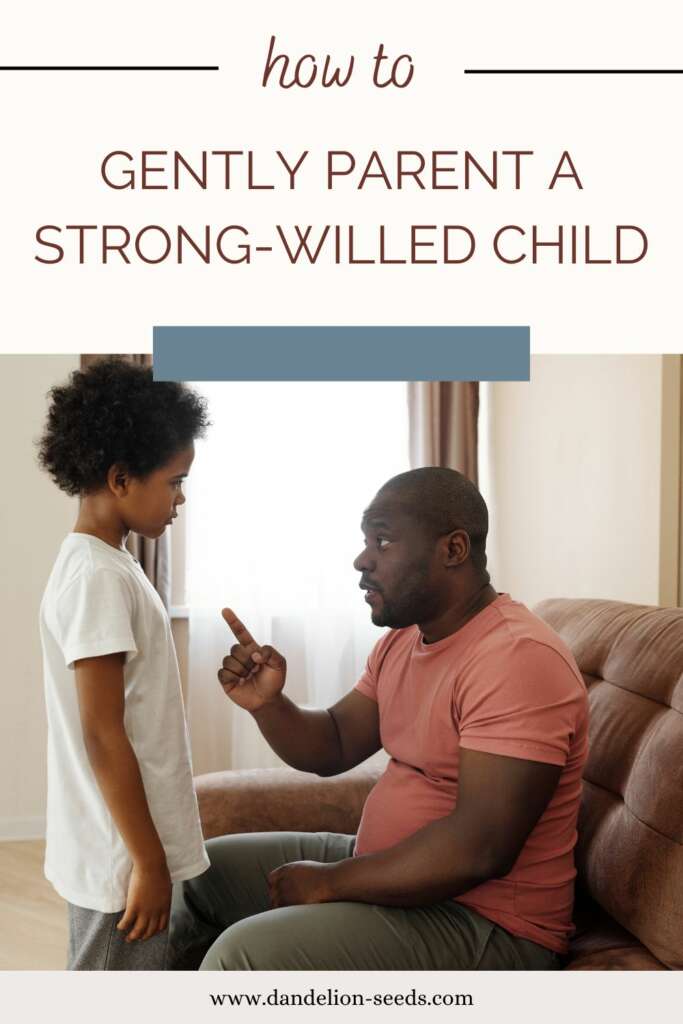
When children push limits, our job is to understand why they're pushing the limit and work to understand them rather than control them. When we make room for them to grow and learn--and learn that it's safe for them to do so--they grow into adults who can adapt, negotiate, and have healthier relationships with others.
Parent goals: "Have a perfect relationship where everyone feels emotionally connected all the time. Life is always one beautiful, smooth path forward. Rainbows and unicorns abound."
Parent goals like that are effective exactly zero percent of the time. They're completely unrealistic. However, we often create all sorts of goals that--honestly--aren't all that different.
Some parent goals sound like, "Self care! Sounds great. I'll do it!"
Or perhaps, "I will stop yelling."
While these are certainly valid big picture parenting goals, I have news for you: they don't work. At least not when we leave them like this.
These parenting goals, and others like them, often fail for the following three reasons:
Our goals are often too vague.
We often choose our goals without input from our children.
We forget our "why."
If we want to raise kids with whom we can have a secure, joyful, and lifelong connection, we must be intentional about it--and our goals need to reflect the life we aim to create.
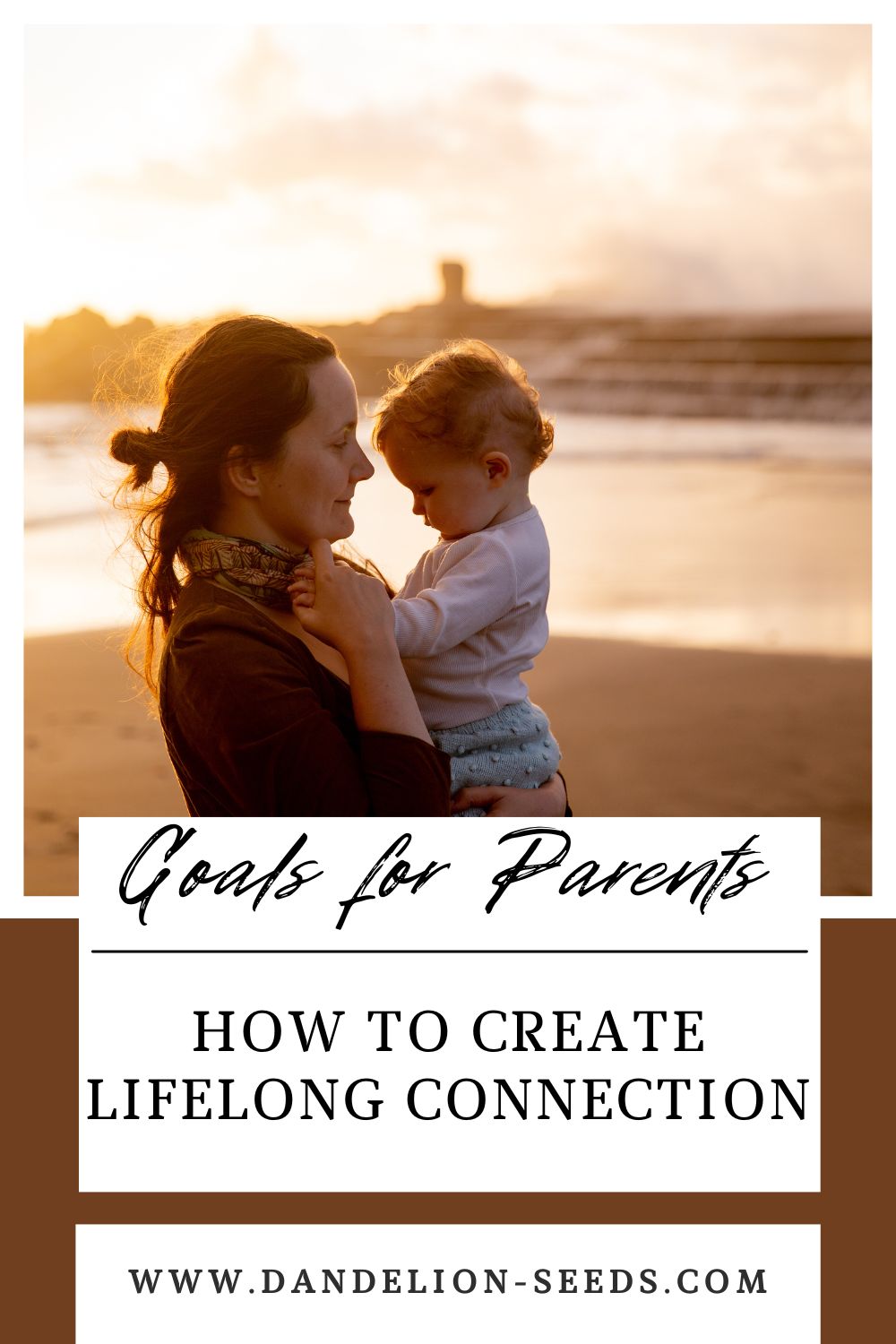
When we create solid parenting goals and follow through, we can get--and stay--closer to our children. It's a lifelong investment. Here's the secret: the goals need to be heart-centered, while still connecting to the rational part of the brain.

Let's go through the antidotes to each of the three problems above:
Tell your brain the details of what changes, specifically, you want to make. The more detailed the changes are, the more achievable they'll be. Describe what we want to change and exactly what that will look like for us.
What actions will we take, specifically, to achieve our parenting goals? This makes it easier for our brain to process, and therefore, easier to implement.
Using the examples above, although self-care and a positive parenting style are absolutely critical skills for healthy relationships with our children, they're entirely too vague. The human brain wants the details of exactly what to do, along with when and how.
Further, the brain can't learn in negatives.
In a simplified example, if I say, "Don't use the red pen," that's all well and good, but I need to tell my brain what to do, instead. "Use the blue pen instead of the red one" is actionable. My brain knows just what I need.
The red pen example is the equivalent of "I will stop yelling." Well, okay, great -- but how? What's the alternative, and how do I get to the point of consistently doing the alternative? What does that look like?
Further, while "self-care" sounds like a good thing (and it is, if we know what we want to achieve by it), it's entirely too nebulous for the brain to grasp. I might be aware that my own needs matter and that I need some way of honoring them in my daily life, but how?
As I wrote in the self-care section of Peaceful Discipline, "I’ve never spontaneously ended up in a bubble bath and wondered how I got there."
We can read all the books in the world about how to handle difficult situations, how to create long-term parenting goals, and how to create a happier family, but if the brain lacks the specific map it needs, those ideas will be right up there with rainbows and unicorns.
I'll share examples of effective parent goals below.
First, though, issue number two.
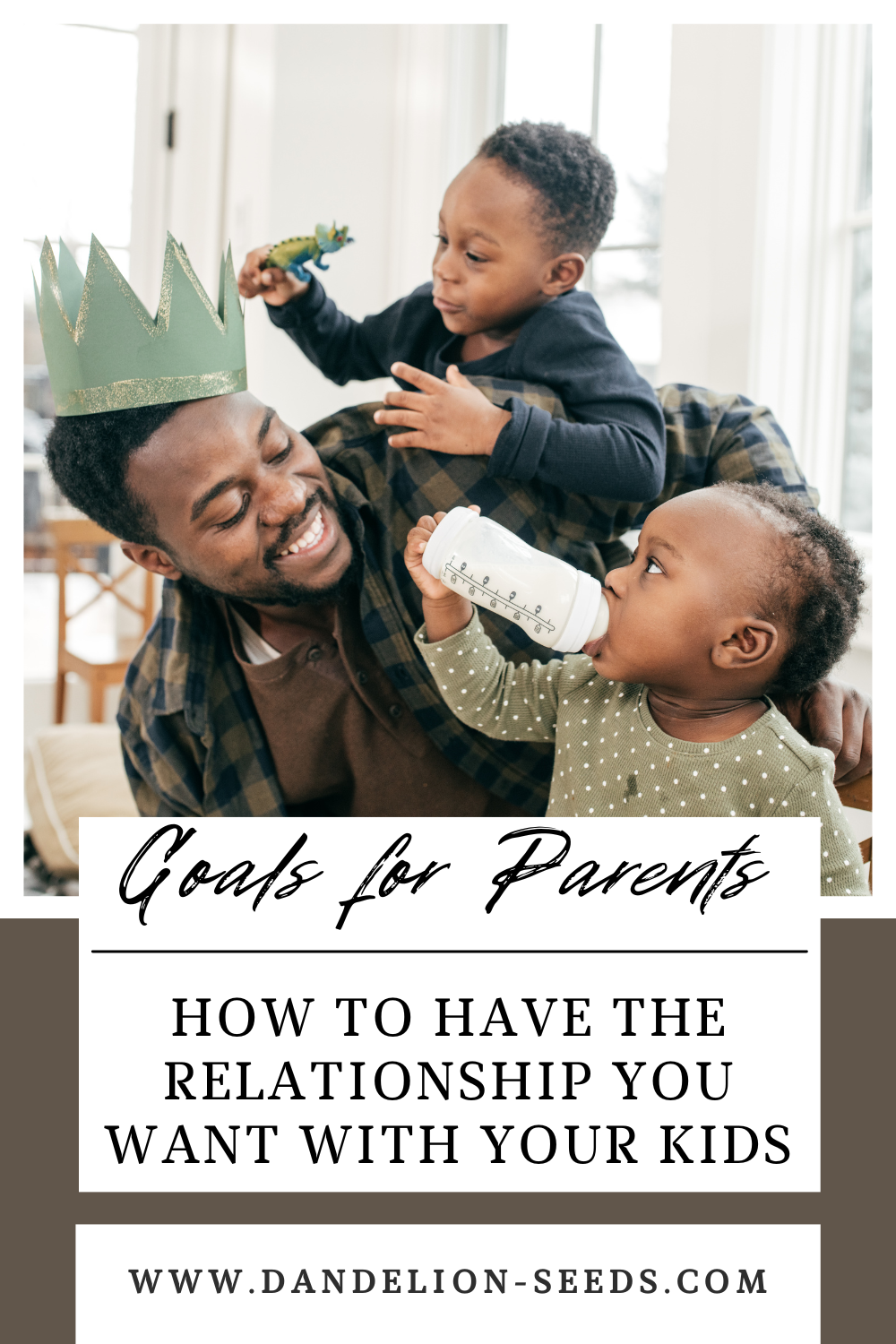
Even from a very early age, we can talk to our children about the kind of relationship we both crave. The best relationship-focused goals aren't made outside the relationship; they're co-created.
Many parents assume their child just wants to "be happy." While that's likely a good guess, even young children have different love languages.
Some will feel loved when you're baking treats and spending time together; other kids will want the parent to have story time, snuggles, and words of affirmation with them every day. Still other kids will feel loved when their natural environment is full of fun physicality and roughhousing.
Not all kids feel loved in the same ways. Likewise, the parent also has different preferences for how love expressed. Do you feel more loved when your child is snuggling with you, or would you rather be playing together? Do you need to be told you're doing a good job at parenting?
There's no "wrong" answer. It's important to acknowledge that we all have different needs.
Knowing this, if we practice inviting our children to join us in goal setting, we end up with more connected families. Everyone feels more "seen" when their opinions have been asked and honored.
This goes beyond the activities our kids enjoy doing, of course. We can also co-create our family values together. Kids want input into the emotional tone of the home, too. Where and how do we want to be spending our time together?
Someday, when our kids look back at childhood, what kind of lives do they want to remember? Let's be proactive about creating that with them.
Now, the third problem and its antidote.
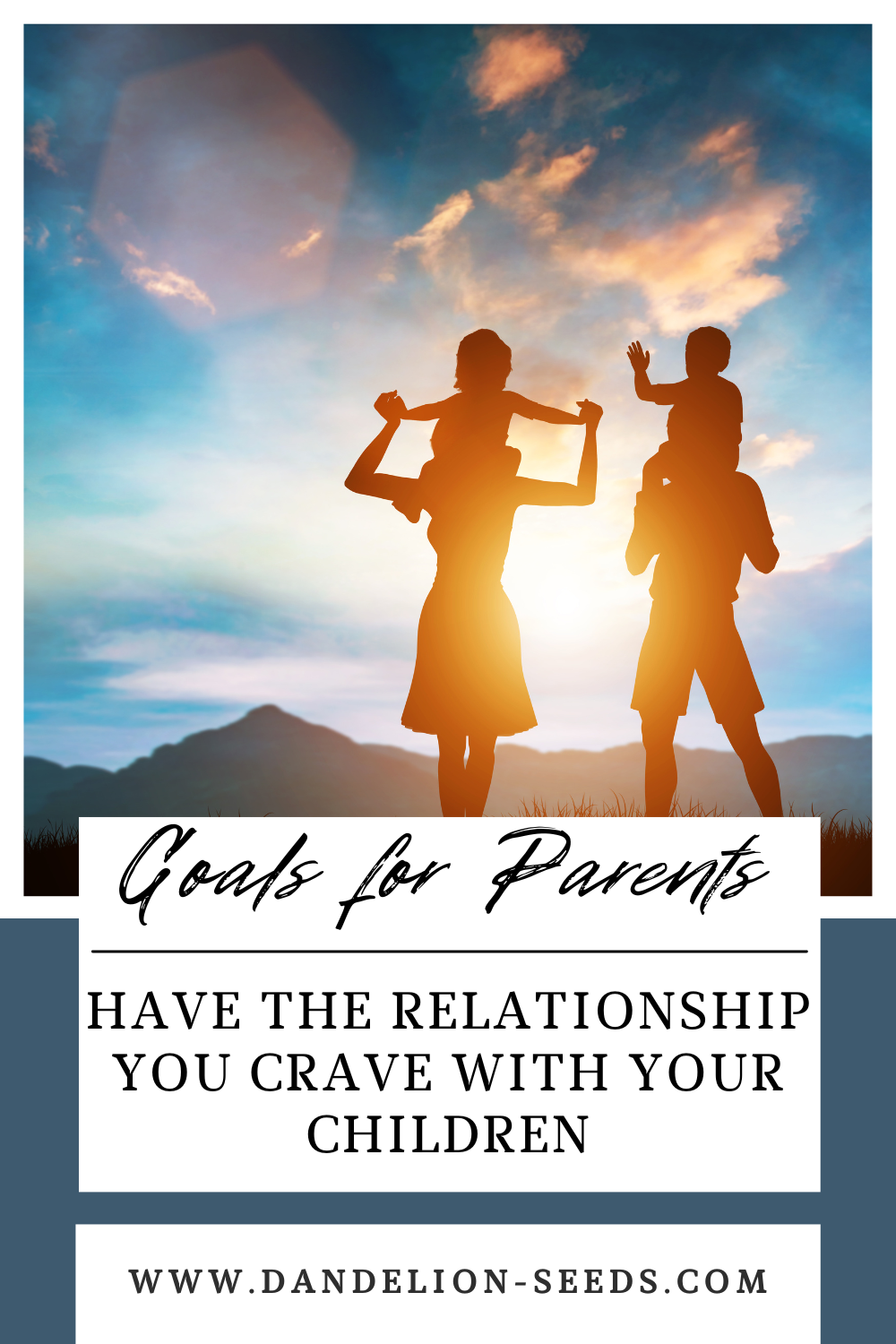
Beyond the decision-making process (which is highly intellectual), we need to create an emotional anchor to keep us motivated. What do we want our relationship to feel like?
It's one thing to read a book or take a course to enhance our parenting skills, but if we've lost sight of our emotional motivation for change, we'll fall short.
If we want to succeed in the long run, we need to check in with how we're feeling--and how we want to feel.
Our litmus test to see how we're doing over time--for both our kids and ourselves--is to see if our lives feel right. We tend to know in our gut when something's missing, but our gut also tells us when we're content.
What skills do we need to feel downright joyful about our parenting, if that's the feeling we're seeking? As parents, what are we actively learning and pursuing to nurture the life we want?
Do we feel that we're parenting in a way where our children will run to us, rather than from us, when they encounter a problem? Is seeing each other the highlight of our day? Are we modeling emotional maturity and seeing our children learn what we're demonstrating? When teaching kids, we must model the healthy habits they'll need to get along with others.
Do both parent and child go to bed at night feeling that the other is a source of emotional safety and peace (although it's certainly not our child's "job" to be those things for us)?
If it feels right, and we're intentional about creating parent goals that support these things, then we're right on track.
Whether we have young kids or older children, it really doesn't matter: mutual respect is what we're going for.
How do we create mutual respect? We begin by teaching younger kids that they are worthy of respect from the very beginning.
As adults, we have a learning opportunity to release whatever old and unhelpful narratives we've been holding about children. We start anew and join the many other adults who've set parent goals with the hope of creating a better world for future generations.

This is a commonly overlooked step that helps us be better parents. When a parent takes time to celebrate our wins, it gives positive reinforcement to our brain. That helps strengthen the new neural connections we've made, telling our brains, "This feels good -- let's do more of this."
At the subconscious level, when we celebrate, we're telling our brain to repeat whatever worked. When it works again, that further strengthens our neural connections.
It becomes a virtuous cycle. This is how healthy parenting habits (and all good habits) are made. It helps them "stick."
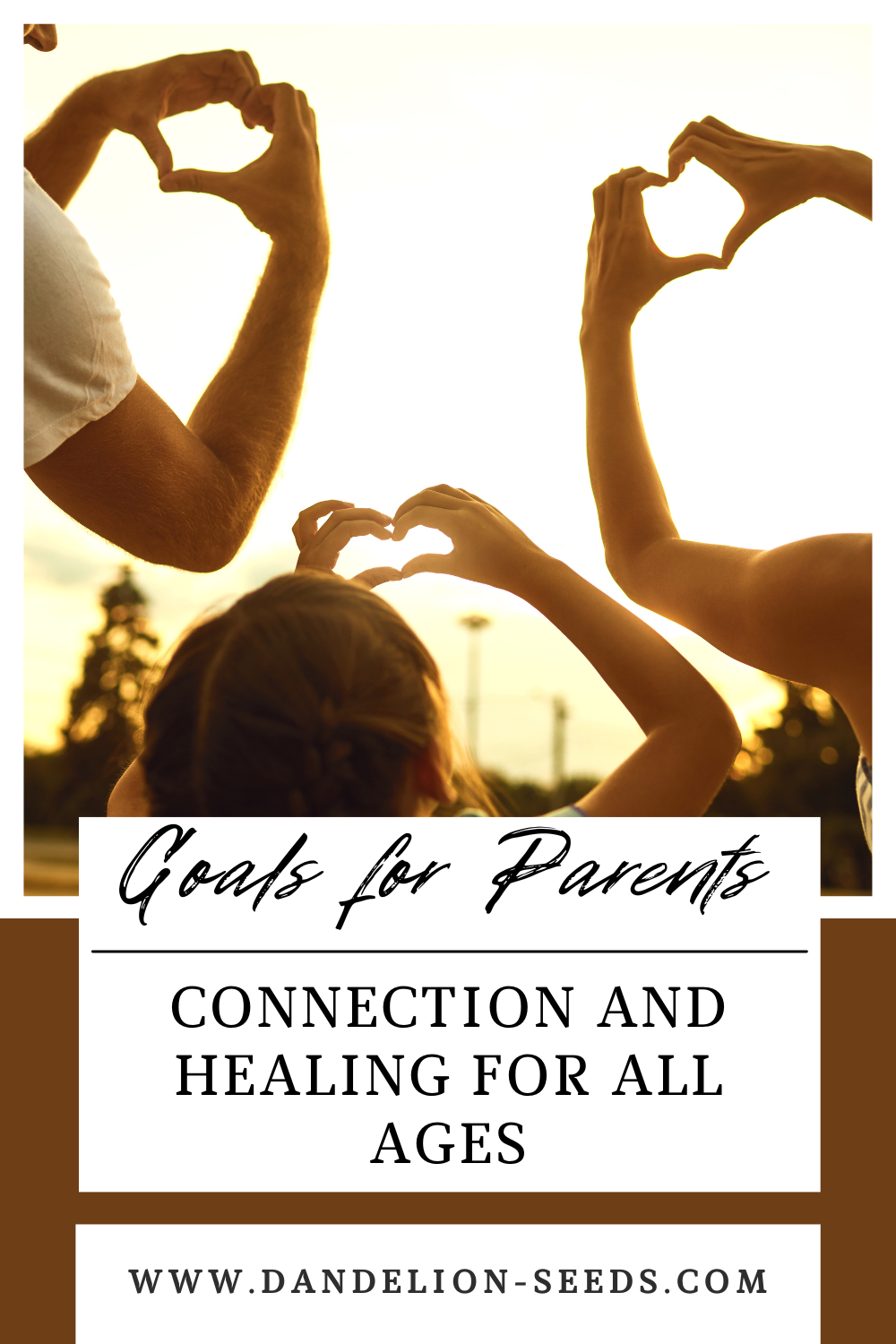
Cake! Always cake.
But seriously, celebrating a parenting win can be as simple as acknowledging that we did what we set out to do. Pause and give yourself a pat on the back. Words of affirmation really do work. It may seem silly, but what we focus on, grows.
If we want to deepen that focus, we can talk to a friend or a family member (or even our kids) and tell them that we accomplished a goal.
With our kids, it might sound like this: "I want you to know I'm committed to being a more peaceful parent. I had an idea that I'd pause and do some deep breathing instead of yelling when I felt tempted to yell, and I noticed that it worked. We had a really nice morning! That felt good."
With adults, we must caution ourselves not to turn the celebration back into a venting session. For example, "When my kids were upsetting me this morning, I got mad but I didn't yell." The other parent might inquire, "What were your kids doing?" That can turn into a discussion of all the things that went wrong.
What works better with a friend or other parents? It might sound like, "Hey, I had a parenting win this morning and I'd like to celebrate it. Can I tell you what worked and felt so good?" Stating our intention helps keep our objective clear and focused on the positive side of life.
Journaling also helps parents reinforce our parenting goals. When we put them on paper, it's a great way to check in with ourselves and observe how far we've come.
Let's be honest: most of us take parenting day by day. And that's fine! We've got a world of things to do at any given moment, from school activities to cooking to adulting in all the ways.
However, if we're parenting for the long run with the good of the relationship in mind, we have to remember that parenting is like anything else.
If we want to enhance our skills, we need to practice. We have to pause before we respond instead of doing what we've always done, we have to check in with our values and ideals.
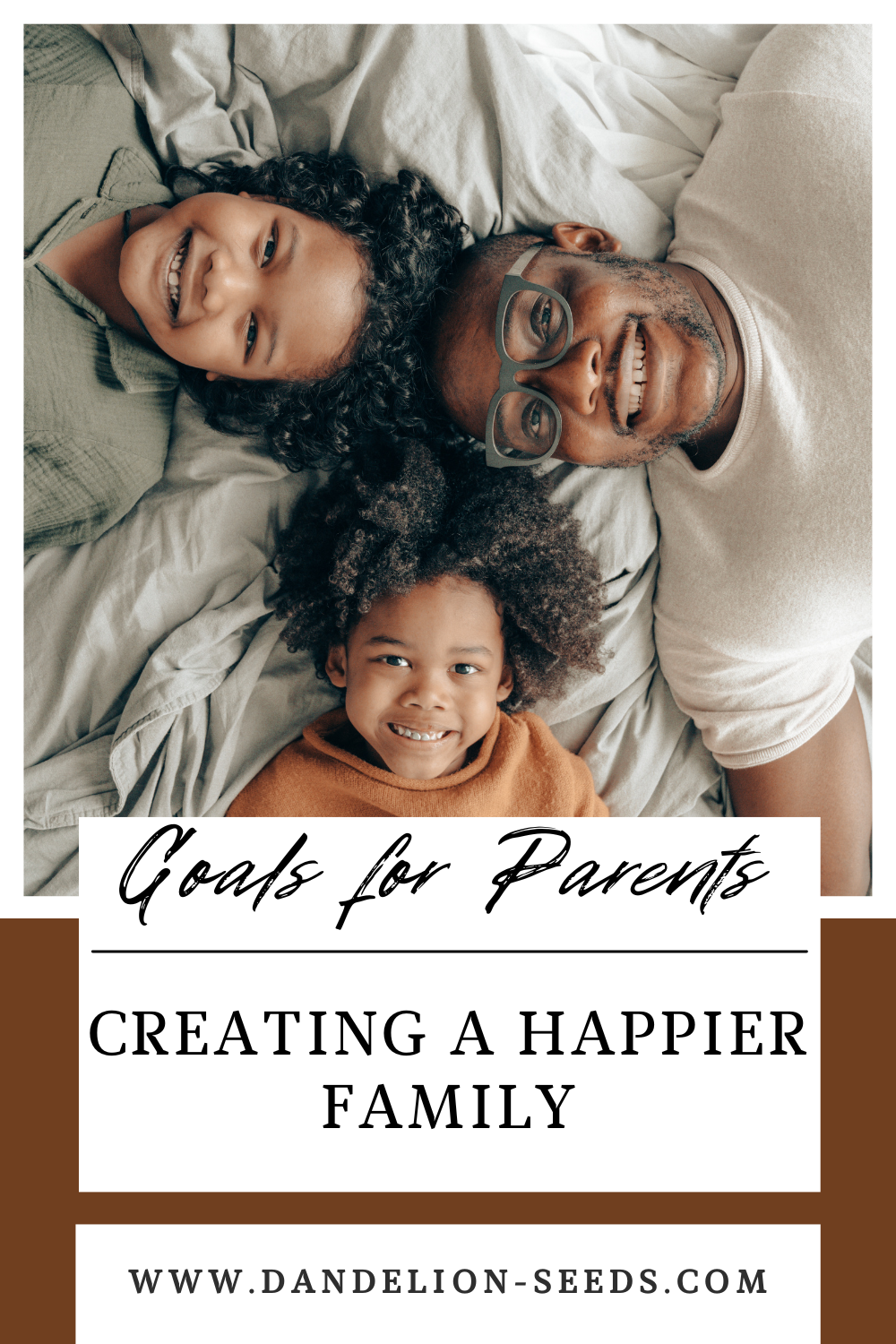
Here are several parenting goals that are helpful for our brains and make it easier for us to follow consistently.
Examples:
"I will allow screen time for my kids while I'm in the shower every morning. When I'm done, we'll turn off screens and go eat breakfast together."
"I care about my mental health, so I will pray or meditate for five minutes before getting out of bed every morning."
"More free time is important to me so I can re-charge. I'm going to put away my phone in the kitchen drawer every night at 8 p.m. so I can focus on activities that matter more to me."
"I want to have fewer before-school battles, so I'm going to incorporate a story time for five minutes on the couch every day before my child goes to the bus. We will snuggle (if my child wants to), but it will set the pace for our day, prioritizing connection over rushing. We'll turn stressful times into special times to connect."
"I'd like to have more fun while I raise kids, so every Sunday night after dinner, starting this coming weekend, we'll have family game night."
"I parent better when I get the occasional break, so every Tuesday for lunch, I'm meeting friends for 30 minutes. Friends help us see the world through a new lens--one where we're moms, but also whole humans with so much to offer beyond that single role. I will make this part of my self-care plan."
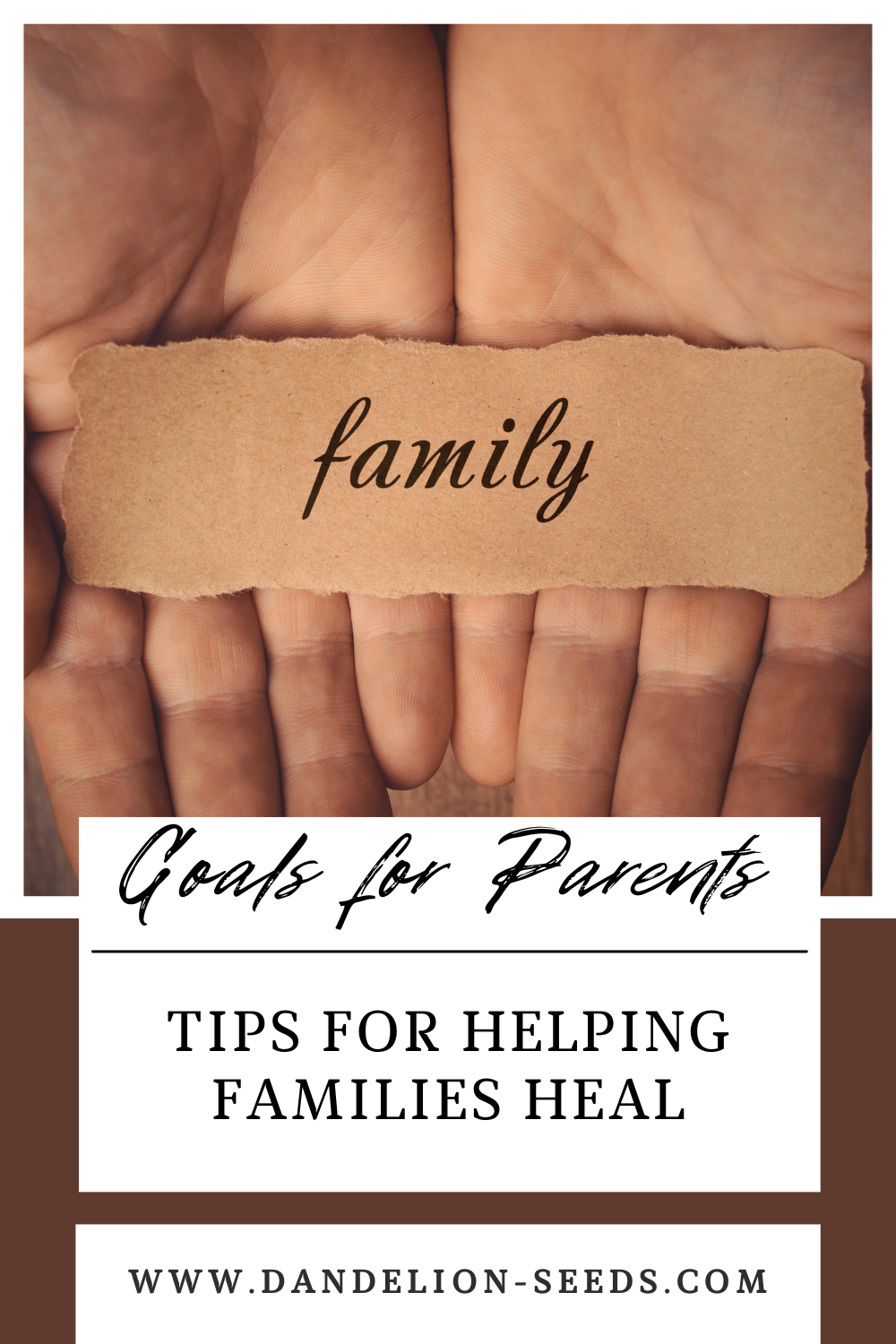
Many adults come up with a parenting goal early in the new year, and that can certainly be a nice calendar reminder to make a change. We must remember, however, that the parenting journey is year-round.
It begins the moment we become parents (or sometimes sooner, if we're really proactive and planning ahead of time), and continues as long as we have children.
We can always invest in our mental health, to the extent that better family relationships affect it (and they do--when we feel closer to our kids and they do to us, too, everyone's mental health improves). (source)
There's no wrong time to invest in a healthier parenting style. If you have a young child, they'll benefit from all the rest of the years you have together. If you have older children, kids learn that it's never too late to heal.

Whether you take an online course (many are available here), read a research-backed book, or work with a certified parent coach or therapist, there are many possible "first steps" you can take. If you're unsure where to start, just pick one. Any one. There's no wrong way to increase your knowledge base, and you can always supplement in areas where you'd like more support.
Perhaps, just for today, the best parenting goal is simply to get started with that first step. Imagine the life you want to have with your children, and then get specific about how to achieve it.
The world can be a tricky place these days. There's no denying that. If we want to raise mentally tough kids who can handle it without becoming jaded--or worse, becoming part of the problem--parents need to empower children to address challenges in emotionally intelligent ways.
We need to raise children who have both grit and compassion for others--not just one or the other. In other words, we want to raise tough kids with kind hearts. This is truly the work of conscious parenting.
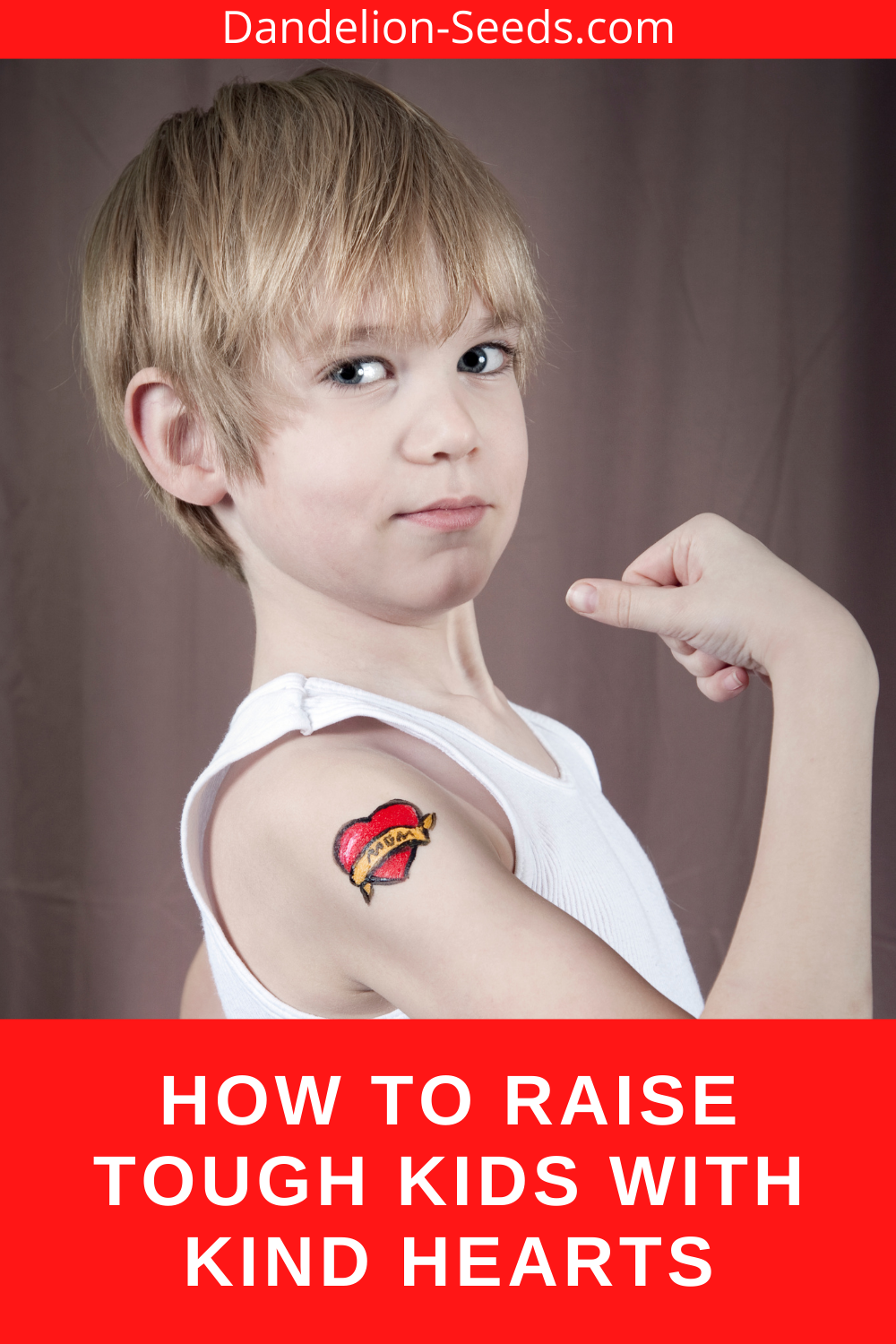
Parents are often (understandably) unsure how to discuss tricky situations with their children. We wonder whether they're too young to "deal with life" as we know it, and whether they'll have the skills to overcome whatever trouble is presented to them.
One common mistake parents make is believing kids are too young to talk about tricky issues. In reality, however, if a child is likely to walk down the street and see the situation with their own eyes, they're not too young for an age-appropriate discussion about whatever it may be.
In fact, if we don't have brave discussions with our kids, we do them a disservice. Family is the safest place for children to learn about struggles and difficulty so that they can create a healthy narrative around them.
Personal example: Years ago when we were living in a big city, someone told me they thought my child, then aged three, was too young to hear about homelessness. However, we walked past people in need every day on her way to preschool. My child has eyes, and she asked questions. This was the prime opportunity to teach her about compassion.

If a child can see something and ask about it, they can deal with an age-appropriate explanation. We help create their reality of what they understand in the world.
In Peaceful Discipline: Story Teaching, Brain Science, and Better Behavior, we learn this:
..."[young] children are still developing their sense of self. They’re learning where they fit into their family, their school (if they have one), and their place in the community. Their family patterns are just being established for the first time. They lack enough past experience to understand the context of situations and how their ability to process them matters.
'Is my experience normal?' children might wonder. 'Does everyone go through what I just did?' As a mere function of their young age, they’ve not yet had the opportunity to decipher all the patterns and schemas that are essential to understanding how life is supposed to work. Everything is normal to them because it’s all they know."
Raising tough kids requires that we help them be mentally strong--understanding how the world around them works, and what to expect from it.
Most importantly, when kids see injustices, we can discuss practical ways to:
Handle any tricky emotions that may arise for them; we get to be their safe place for questions, and
Grow their confidence around their abilities to help others.
It's true what they say about the world being harsh, but our child doesn't have to be part of the harshness. They can be part of the solution.
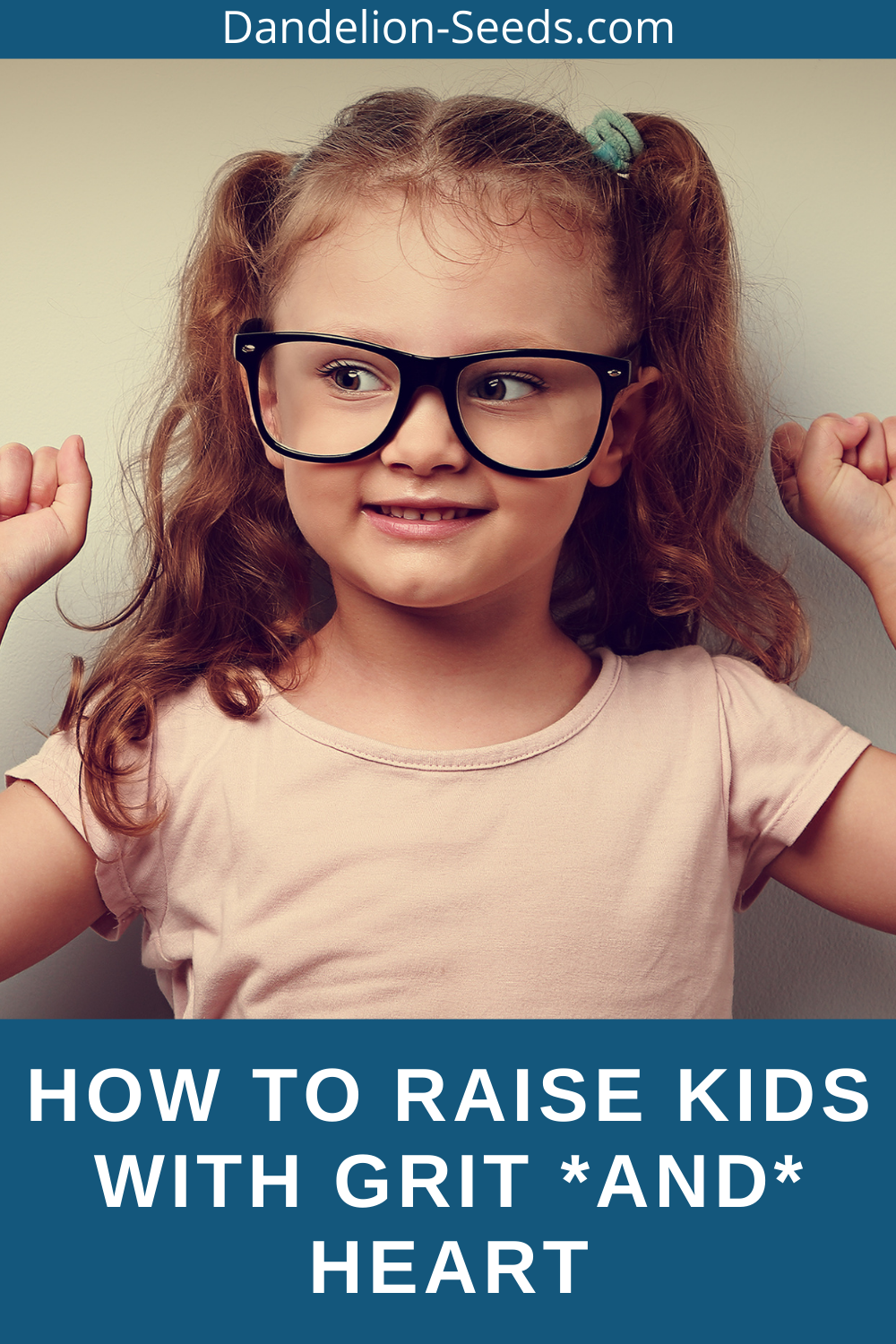
Absolutely not. To the contrary, for their optimal development, we need to give kids "a soft place to land," as Deborah Harkness so aptly put it. That means that we need to be their emotional safety net.
They need to know that we'll love them unconditionally and support them when they struggle. We'll answer their questions with love and compassion. We'll show up for them when they need us.
The point is not to "toughen up" our children; toughness alone leads to emotional distance and a whole host of potential struggles. When we focus on resilience with support, however, that raises mentally strong children who thrive because they felt emotionally safe enough to overcome adversity.
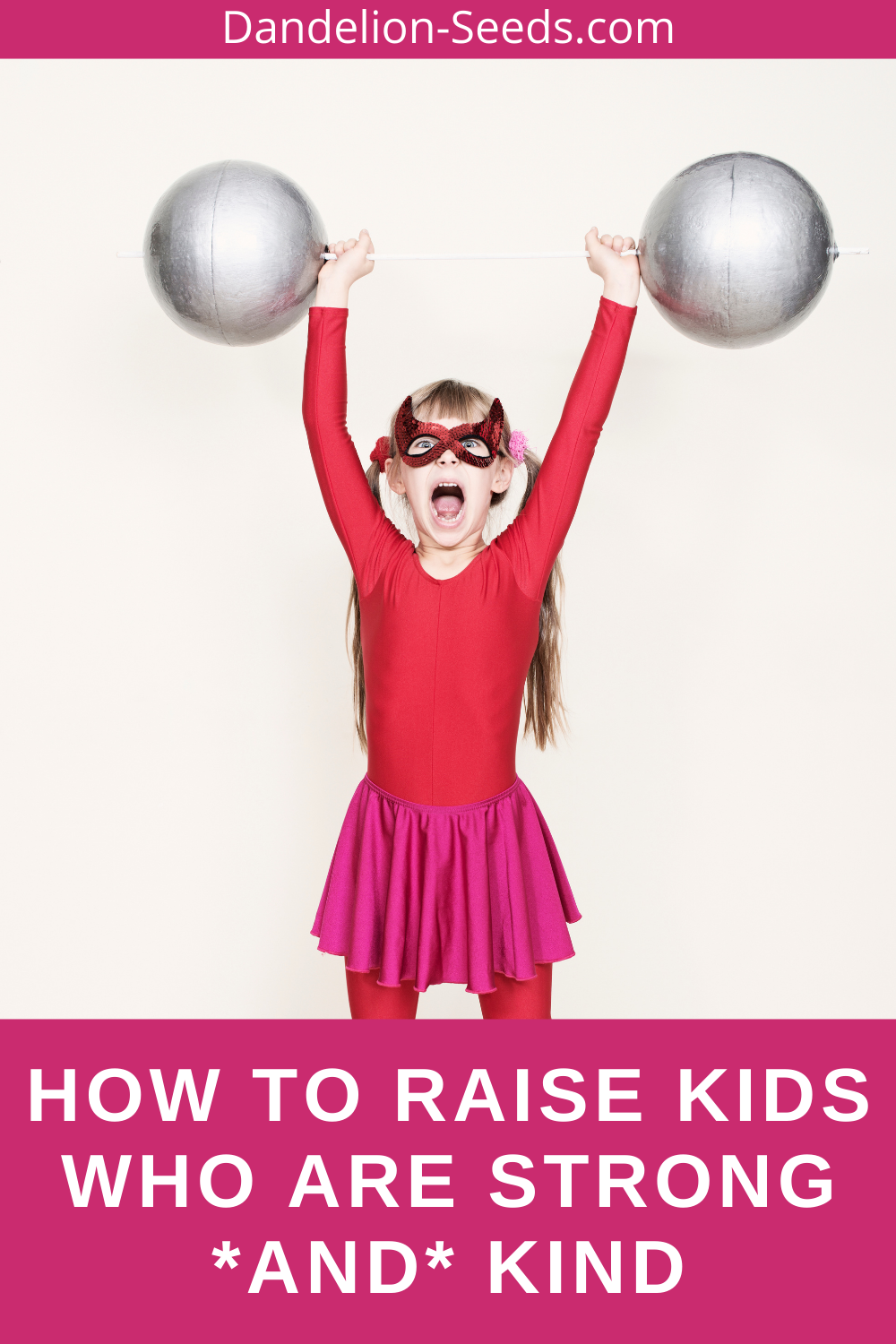
We know from brain science that kids learn best when they feel emotionally safe. Here's what Peaceful Discipline and the research say about it:
"...when [kids are] emotionally triggered, the limbic system (a more primitive part of the brain) takes over and effectively shuts off the frontal lobe, where most of our rational thoughts live. The limbic system’s sole purpose is to keep us alive. The frontal lobe is where we can think about others’ experiences, offer compassion, and understand the consequences of our actions.
The limbic system doesn’t understand that we’ll ever be all right again, because it’s not planning ahead—it’s trying to keep us safe in this moment only. Our goal, therefore, is to help the body feel safety so that our frontal lobe can come back and join the whole brain party. No one can talk us into safety if our limbic system is overriding it; we must feel it for ourselves."
The frontal lobe needs to be "online" in order for children to learn. When children feel safe, not only do they exhibit fewer behavioral issues, but they're also more likely to be able to grow through tough situations rather than be hindered by them.
Emotional safety helps raise tough kids, because they know they don't have to be tough to win our approval. They already have it. It's built into our parenting and our relationship with them.
Part of this emotional safety comes from learning empathy and emotional regulation skills.
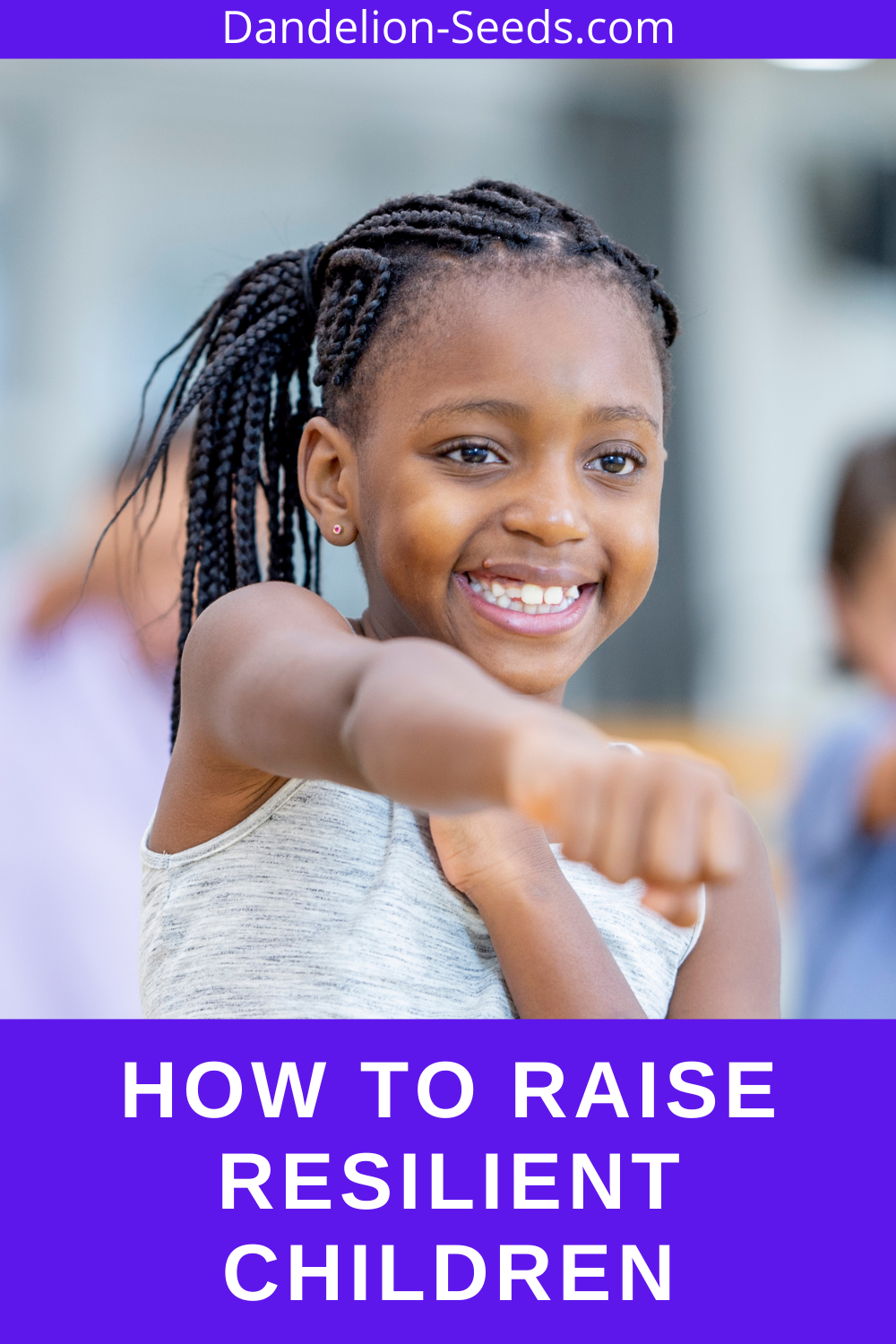
One of the best gifts an adult can model for a child is empathy and emotional maturity. If a child is "acting tough" but displays no empathy, they're more likely to end up struggling in school and at home.
Empathy, emotional maturity, and compassion are learned skills, however, and they take time to develop. There's no rushing brain growth and child development.
The most effective way to raise a child who has empathy is for the parent to model empathy.
Parents can do this a couple of ways. For example, we can validate our child's emotions rather than dismiss them. For example, if a tough event happens at school or otherwise, the parent can say things like, "Gosh, that sounds really hard. I understand why you're so sad. You make sense to me."
This is a much more effective approach to help the child feel "seen" so that they can move on from whatever stress they experienced, rather than having had their feelings dismissed (i.e., "That's nothing to worry about--you're such a crybaby").
Over time, children will have observed and felt enough empathy--and their brains will have grown enough--that they can start to "pay it forward."
Empathy is a healing tool to help them recover from adversity.
Tough kids--especially those who've been raised in or experienced tough circumstances--need extra empathy from us, not less. It's part of what helps soften their rough edges.
According to research-based strategies about raising tough kids from Dr. Michele Borba in Thrivers, we can provide children with these additional skills:
Self-confidence
Self-control
Integrity
Curiosity
Perseverance
Optimism
Once again, kids and young adults can learn these skills. They don't have to be born with them (in fact, they aren't)! Resilient, tough kids are kids who've had good role models who also model these things.
Raising tough kids with kind hearts requires that we show up for them; let them know that they matter. We can remove the focus on whether they're behaving well and, instead. make sure they know they're loved well.
Children who grow up knowing they're safe with us translates to having kids who know the importance of creating emotional safety for others. This is the optimal way to raise tough kids with kind hearts: focusing foremost on the heart, and all the rest falls into place.
The best Christian parenting books are those that not only give practical advice, but that also help us reach our child's heart. After all, emotional safety is at the core of what helps children want to do well for us as their parents.
The children who feel the safest with us will legitimately want to learn from us.
In Christian parenting, our children check to see if our love mirrors God's love--do they see us living by the fruit of the Spirit--"love, joy, peace, patience, kindness, goodness, faithfulness, gentleness, and self-control"? (Galatians 5:22-23 ESV)
If they see us embodying the fruit of the Spirit in these ways in our parenting, Christian beliefs will feel safe to them. They'll want to walk with Christ on their own someday when they're older, because he felt peaceful through us, first.
When we do this, we're speaking their ultimate love language.
Indeed, many of us actively work to live by the fruit of the Spirit every single day. We know we're imperfect, but from the Christian mom writing this article to other Christian parents, we know we're trying.
We're balancing Christian guidance and biblical living with an increasingly secular world, and it's not easy.
And some days, when the "big picture" view of the world feels particularly tough, we wonder whether our Spirit-filled parenting style is really changing the world
Are we bringing children up in a way that will set them up for judgment and failure, or are we raising healthy sons and daughters who fully embrace Christian living?
Will they be able to withstand peer pressure and many of the temptations that surround them?
Will they have a firm foundation on which to grow?
In short, can we change the world through our parenting?
Moreover, how can we spread Christ's message without the secular world shutting us down before we get a word out?
We know we can affect our own children, but can we reach the hearts of other parents, too--even those who don't want to hear about Christianity?
That's a tall order.

Many people, unfortunately, will automatically pass on Christian parenting books we recommend to them simply because they're labeled as Christian. They may say, "No thanks! That's not my thing."
I respect that. Even Jesus didn't force anyone to believe in him, so it's certainly not our place to do so.
At the same time, it's one of many forms of spiritual warfare that we face--how and when do we encourage other moms and dads to follow a Christian parenting journey if they're turned off by the very mention of Christianity?
Here are two reasons some of the best Christian parenting books might not look like they used to.
1.Christ has always worked in unconventional ways--and he's still doing that.
A biblical truth is that Jesus was about as unconventional as they came during his lifetime. The Pharisees were considered the be-all-end-all for "religion," yet he despised them.
On the other hand, the tax collectors whom everyone else despised?
Jesus hung out with them--including Matthew of "first book in the New Testament" fame, not to mention others like Zacchaeus.
Perhaps it teaches us that, like Jesus, if we want to help spread the word of Christianity, we need to do it in places that people won't expect.
For instance, we can read and recommend a parenting book that is not overtly Christian.
I realize that this, too, is unconventional.
Bear with me for a moment.
Some parents are going to turn away from rock-solid information simply because it's labeled as a Christian parenting book. That's a hard reality.
It may be tempting to also say, "Well, if they don't want the message, that's their loss."
Last I checked, though, it's the lost sheep that Christ wanted most.
If we're going to pursue Jesus in our daily lives, we need to be like him...and not try to force non-believers to read "Christian books." It's just not going to fly with them.

We know that if people are going to come to Jesus, they'll judge us by our actions, including (and perhaps especially) in our parenting:
Are we seeking only to have so-called "obedient children" who blindly listen, or are we deeply committed to hearing our child's heart, just as Jesus does for them?
Are we teaching kids about Christ's love through fire and brimstone (fear-based parenting), or are we tuning into their love languages and helping children feel seen and loved for their wonderful and unique personality?
Are we losing the next generation of followers by raising kids who feel "Christian parenting" is emotionally unsafe, or will parents pass along the comfort and grace that Christ does?
Other parents are watching. If we're parenting our children with love--if we're leading with grace--if we're living as a lifegiving parent who displaces fear with connection that makes children run to us rather than away from us when they're struggling, people are going to notice.
So, when non-believing parents ask us if we have any parenting books to recommend, yes, sure, we can mention some that are overtly Christian, full of Biblical references and so forth.
These are absolutely valuable, and I'm not saying they aren't. And there's certainly no better book than the Bible itself.
At the same time, we can also know that Christ sometimes works through whispering to the heart instead of through neon lights.
Some books, like Peaceful Discipline, are written by Christian authors and are of the "whispering" variety.
They're the kind that say, "You're welcome here. Let's grab a cup of tea and hang out for awhile."
This will feel emotionally safer to many people, and it's a strong starting point to get them curious.

My favorite books, truth be told, aren't necessarily marked as "Christian," particularly because I find many of the popular ones to be contradictory to what I believe families need. More importantly, I see many that don't seem to be in line with the fruit of the Spirit.
The authors may say they're Christian, but I don't always feel God or grace or any inkling of how vast I believe his love to be. To me, this is a red flag. I won't buy them, much less use them as a guide for how to raise my daughter.
Many books will help us set rules, but without a focus on connection, the rules will be meaningless for our children.
Other books talk about punishment, but lack encouragement--and that can drive many away from faith.
Many teach that we need to be harsh with our children and raise them by "the rod," but neglect to mention that the rod in the Bible is used to peacefully guide sheep and drive away predators, but not harm the sheep themselves.
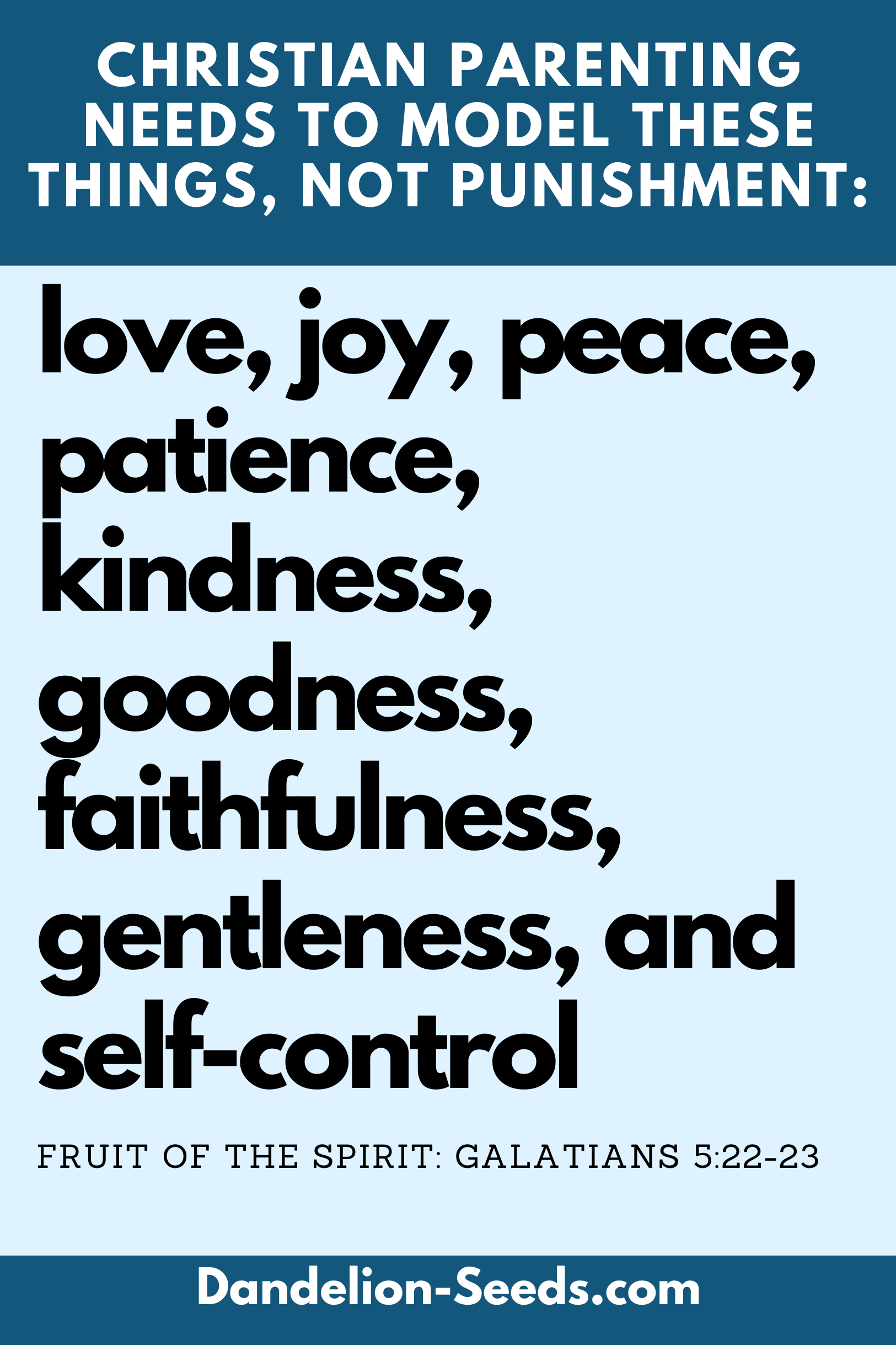
Therefore, I'll go back to the fruit of the Spirit once again and see how we can use that to drive family-driven faith, more than any other single insightful book beyond the Bible:
After loving God, do we love our neighbor? Would we be willing to consider that our child is our neighbor?
Do we delight in our children in a way that they can feel, knowing that delight is one of the basic tenets of secure attachment?
Does the grace we've received spill over into our parenting, so we can live peacefully with our children?
Are we patient with our children? Do we have the sensory calming tools and other resources to keep our calm in the proverbial storm?
Are we showing Christ's mercy and kindness to our children?
Do we see the goodness in our kids and share our goodness with them, even knowing we all mess up sometimes?
Are we raising grateful kids by modeling genuine gratitude for the gifts we've received that help bring us closer to Christ? Are we looking for "proof" of our child's heart being faithful, or can we trust that to Jesus?
Are we being gentle with our kids from their perspectives, not just our own? After all, it's their perspective that matters to their hearts.
Are we able to feel and express anger in ways that do no harm to our kids or to our relationship with them? Can we stay calm enough to express ourselves peacefully, or seek support when we need it?
If we can model these things for our children and for other adults around us, they'll learn how to find more peace, as well. My hope is that you'll feel the fruit of the Spirit very much alive in Peaceful Discipline.
If you do, I'd love to hear about it. If you don't, I'd love to hear from you, as well.
As for specific books other than my own, I do like The Five Love Languages of Children by Gary Chapman, another book written by a Christian author where the book isn't expressly Christian. It helps us parent our kids well by understanding them, knowing parenting isn't a "one size fits all."
Any book that helps us teach our children through encouragement and connection is a "win" in my opinion, especially when written by a Christian author who's inspired by God.
Any book that claims to be faith-based but recommends punishment rather than grace is an automatic "no" for me. There are plenty of these, unfortunately.
Choose carefully, remembering again that there is "no condemnation for those who are in Christ Jesus." (Romans 8:1 ESV)
Jesus was punished so we didn't have to be. Once again, we can guide our children and teach them, but if God removed our punishment (and that of our kids), who are we to override his decision with punishment for our kids?
We can choose to be peaceful with them. We can invite them into relationship with us through our gentle guidance and love--we can be the kind of parent they'll want to return to when they're older.
So maybe, just maybe, some of the best new Christian parenting books aren't overtly labeled as a "Christian parenting book." Instead, perhaps the best Christian parenting books are the ones that feel different and guide parents to living out Christ's love, even if they don't realize that's what's happening yet.
My prayer is that non-believers will say, "Something feels different about this book, Peaceful Discipline. What's this author like? Where do they get their guidance? How can parenting feel like this?"
Perhaps part of God's plan for you is to reach others through whispers of conversation starters, as well. As it turns out, connection is what we all need, and it's the foundation for the deeper discussions to come.
May you feel the presence of God in every aspect of your life, including in your parenting. There's great hope for you and your children, and great hope for every family who wonders where your peace originates.
To clarify, my intent is not expressly to "convert" non-believers to Christianity. That's between them and God, and it's well beyond my pay grade.
Rather, my intent is to help bring more peace to every family I have the pleasure of meeting, influencing, or otherwise knowing.
As I've said before, I truly believe that peace on Earth begins at home.
If children feel loved and valued, they have the ability to love and value others. They're not bringing childhood traumas into their future relationships.
Instead, they're bringing peace and the love they received at home to their future friends, partners, and co-workers. That's what they'll have to give.
If knowing about my inspiration from God helps them get curious about him, that's great. However, if they're not open to God yet (or ever) yet still treat their kids with more peace, and parent from connection rather than fear, that gives me incredible hope for a better world.
I don't pretend for a moment that Peaceful Discipline will show people how to be Christian. That's not the point, and it's not expressly what the book is about.
What I want is for non-believers and believers to co-exist peacefully.
Step one, in my opinion, is the hope that non-believers will cease believing that Christians are "scary" or "oppressive" or "crazy" or any of the other unflattering adjectives that are bandied about in this day and age.
I promise you, I am not among those who support oppression or any of the injustices we've seen so often in recent years. I don't believe Jesus would be on board with those things, either.
May we have mutual acceptance as a starting point; may we truly love our neighbor (and not just the neighbor who "says the right things.")
May we choose curiosity over judgment; compassion over emotional distancing. The world has too much conflict right now.
We need to start the healing process somewhere. Peaceful Discipline may show us how to get started, even if reading the book is all we have in common with the person sitting across from us wherever we happen to be reading it.

My prayer is that Peaceful Discipline will help us all be kinder to one another, no matter what we believe. Our kids will feel the shift not only in our family, but they'll also see it in the world around them.
It's time for a more peaceful world. Will you join me in helping that happen?
Sleep deprivation and other struggles in the early years are real, and it doesn't take long before bleary-eyed parents of small children ask, "What's the magical age? WHEN does parenting get easier?"
As exhausted as you might be right now, there's hope for parents at every stage of their child's development. I'll go through each stage in detail to help you feel more ease in your parenting journey.
Huh?
I'll get into the details of how this works in a moment, but the short answer is that parenting won't get easier if you get caught up in the narrative of how "easy" parenting should be every moment of the day.
That's just not reality. Parenting can be truly be exhausting. We need to shift our perspectives and our expectations.
They've given us the false perception that if we just do x, y, and z, we can parent on auto-pilot. We believe our two-year-old will be making their own gourmet meals every night and we'll never have to lift a finger if we've read the best parenting books and said "abracadabra."
If only, right?
Still, we don't have to settle for the inevitable difficulty of parenting, because parenting truly doesn't have to be so very challenging all the time.
A big shift happens when we explore two key concepts that make parenting easier. Perhaps surprisingly, though, they're not about what our child is doing.

When parenting gets easier largely depends on us. Specifically:
We examine our mindset. The way we think about our children matters. The good news here is that we can train our brains to see our kids in a positive light, no matter their age or developmental stage.
As part of our mindset work, we can also work on our family of origin "stuff" so that we're not carrying forward any pain or trauma that our children don't need to inherit from us.
We get curious about our children's authentic experiences, from their perspectives. Once we stop "thinking like adults" and put ourselves in our children's shoes -- and strive to understand what's going on for them socially, emotionally, and developmentally -- it can make a whole world of difference.
Being ready to see things from a different perspective directly affects what makes parenting easier.
This is paradigm-shift parenting for a better relationship with our child, forever, and not waiting for our experience to magically be "easier." There's no snake oil for this. We've got to emotionally invest in self-care and compassionate, responsive parenting.
Once we do these things, our reward will be easier parenting.

How we choose to see our children and each different developmental stage directly influences our perspective of whether parenting is easy or hard.
I'll go through each phase separately, from the baby years to teenagers. You'll see that you don't need to wait for parenting to get easier. Easier parenting is within your reach starting today.

Whether you've just had your first child and they're only a few months old, or if you've got more kids than you can count, what makes parenting easier at the baby stage is a couple of things:
Quick reframe on what it means to figure out sleep: this means that in the early years, needs for rest will ebb and flow. If you have a so-called "easy baby" who can sleep through the horn of a freight train (not to mention your older kids' noises), great. If you have a baby who wakes up just because you blinked, that can be normal, too.
The point is that sleep is an individual trait. Because it's developmental and can't be forced, there's no way parents can "make" another human sleep.
Once we emotionally accept that parenting at night is normal, parenting gets significantly easier. We can relinquish all beliefs that only sabotage us and make parenting harder, such as feeling we need to "own" or "fix" someone else's sleep cycles.
Instead, we can organize our slumber time locations and parenting perspectives to maximize shut-eye for everyone. Trying to control others' tiredness just makes our lives unnecessarily complicated.
Every age has different parts that are easier and harder, and for the baby years, sleep can be one of the hardest parts. The mother often (but certainly not always) bears the brunt of it.
Personally, many of the challenges I faced early on were due to a lack of support. My husband was helpful, to be sure--but he worked full-time, so parenting was completely on me all day long. Further, as a breastfeeding mama, most parenting was up to me at night, too, although I was very grateful for his midnight help with diaper changes.
My mother lived across the country, and most of my friends were at the point where their youngest child was already in high school. Although they loved me, they were also busy with their own lives.
Other adults I knew had no kids, so they mostly wanted to spend time together like we did before I had my child. That just wasn't feasible for me.
In hindsight, one positive way I could've gotten help was to join more parent/child activities. My postnatal yoga class was fantastic, but there were all sorts of other groups for new mothers that I felt too tired and overwhelmed to attend.
No, they weren't going to come feed the baby at 3 a.m., but they'd have given me support in emotional ways that could've offset my mental exhaustion.
Help for new parents really makes a difference, and we're not a burden for asking. People who've been there, get it.
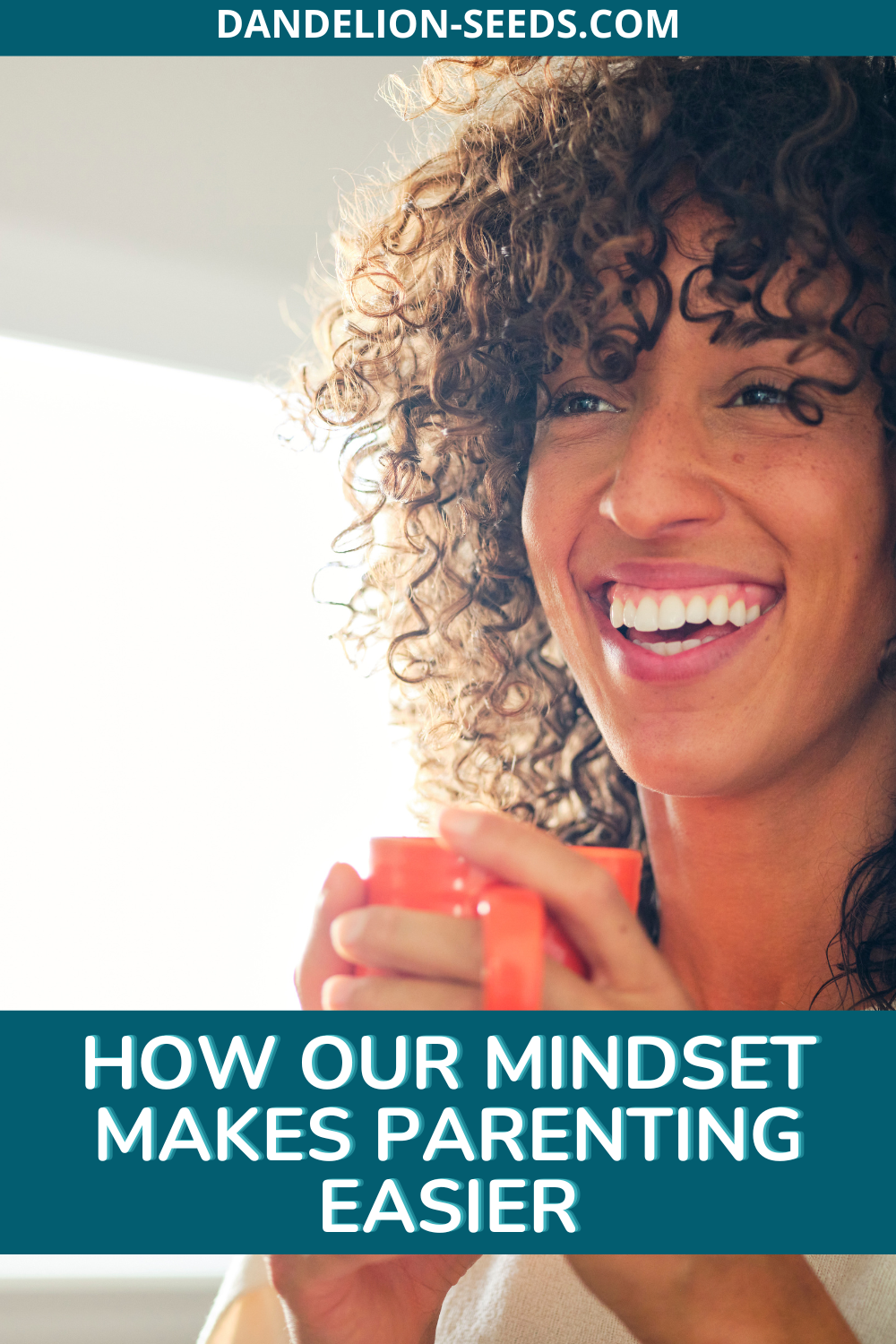
Toddlers start off with an incredible disadvantage in life, especially when we hear erroneous titles like "terrible twos" being bandied about.
Our mindset -- expecting these years to be "terrible" really can mess with our perspective. Our brains seek something called confirmation bias, which means "...the tendency to search for, interpret, favor, and recall information in a way that confirms or supports one's prior beliefs or values." (source)
In other words, a toddler might be delightful 98% of the time, but if we believe kids this age are "terrible," we'll look at the other 2% and our brains will essentially say, "See, I was right!"
The way we view kids matters, and the paradigm shift to make parenting get easier at this age is to realize the toddler is doing the best they can with the physical and emotional skills they've learned so far.
And it's really hard to learn everything you need to know about life when you're only a toddler. You're naturally going to get things "wrong" a lot, even if you have the best of intentions.
Yes, they can do more than they could when they were babies, but just because they're learning to walk and talk and do algebra (okay, just making sure you're paying attention), doesn't mean they can consistently behave at this stage as adults do.
The world is new to them, so rather than being hard on them because they seem to understand so much more than they used to, remember that the child at this stage is still mostly a baby in a slightly bigger body.
Play with them. Learn about them; have fun, and practice connecting emotionally. You're not only raising a child, but even more importantly, you're training yourself about how to show up for them.
Give them a whole lot of grace, and be kind to yourself while you're learning how to parent these young children.
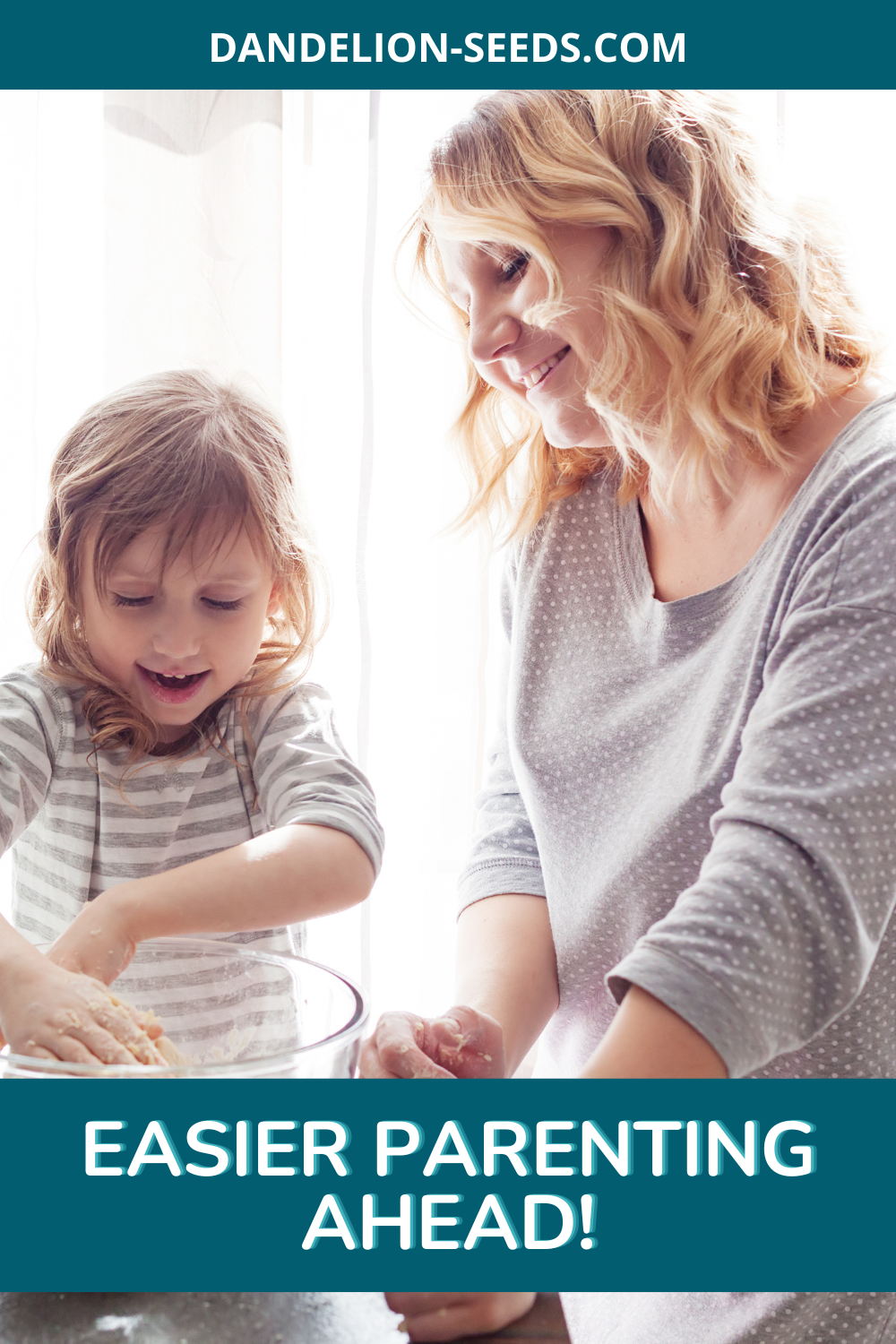
True, the skills are growing exponentially at this age! Children here are starting to have friends and early social relationships. They've been watching the world for a little while now and are figuring some things out.
Even more than toddlers do, however, they often push boundaries and actively work to figure out their place in their family and in other relationships.
The mindset shift we can make here to help parenting get easier is to realize that it's important for them to practice pushing back and "being defiant" at this age. And they're certainly not always defiant. Often, they're wonderful and joyful.
Psychologically, it can help to reframe "defiance" as "learning about how to set and receive healthy boundaries."
We should not only mentally prepare for some struggles (because we're humans raising humans, no fault of the child's), but even more importantly, continue nurturing our conscious parenting skillset.
If we haven't started already (and I hope we have), this is a critical age to learn how to earn and keep our child's heart.
Why?
Parents are the safe place our children must practice pushing back before they're in school and need to express their limits, likes, and dislikes with others.
If parents haven't "allowed" this developmentally normal pushback, children may learn that speaking up for themselves isn't safe, or that their voice doesn't matter.
When we treat them with respect and accept that "talking back" is a life skill that they'll need in order to have healthy relationships (think of it as "speaking up!"), parenting gets easier.
As an aside, there's no magical age when respectful parenting is no longer the recommended approach to backtalk; we can always model grace and kindness. Those, too, are life skills. You'll see this come up again here shortly.
As a bonus, parenting gets easier during this age range because children are now potty trained (or, perhaps more accurately, have learned on their own). Not having to change diapers is a nice shift in lifestyle.
They've also likely learned some communication skills and are starting to learn empathy.
The tween years are wonderful insofar as we don't need to spend them dreading the upcoming teenage years, but instead, we have this magical age where we get to enjoy interesting conversations with children who still genuinely like to be with us.
They vacillate between acting sweet and "little," and being incredibly capable and competent on their own.
The mindset shift we can make here is to simply enjoy these years, rather than mourn the "little kid" time being gone, or fearing what's ahead.
In fact, if we want to further solidify our gentle parenting journey with our children, this is a fantastic time to do it.
Why?
Whether these children are in school or learning from home, they're likely facing bigger social challenges than they used to, or having bigger questions about societal issues.
If we prioritize connection at this age, they won't be left wondering whether we're really their "safe place" emotionally. We'll have less to worry about during the next phase if we've invested in our future teenager.
By now, they've learned how we manage stress effectively (or don't); they're learning whether we're the parent they can trust with their "big stuff" as it comes up.
Plus, they're still young enough that we can still have a lot of fun together before they move onto other things besides us as their primary entertainment.
Other important things to note:
For children who go to school, after-school restraint collapse is a real "thing." Once you understand it and can proactively prepare for it, this part of parenting gets easier.
Their brains are about to enter a major growth spurt, and this can be a time of great transition emotionally.
"...For girls, the brain reaches its biggest size around 11 years old. For boys, the brain reaches its biggest size around age 14" and the brain continues to mature even when it's done growing. (source)
Still, this can be a tricky age for children who are developmentally caught between childhood and being "big," and it can feel -- consciously or subconsciously -- overwhelming to them. If you have concerns about their mental health, checking in with a family therapist can be beneficial.
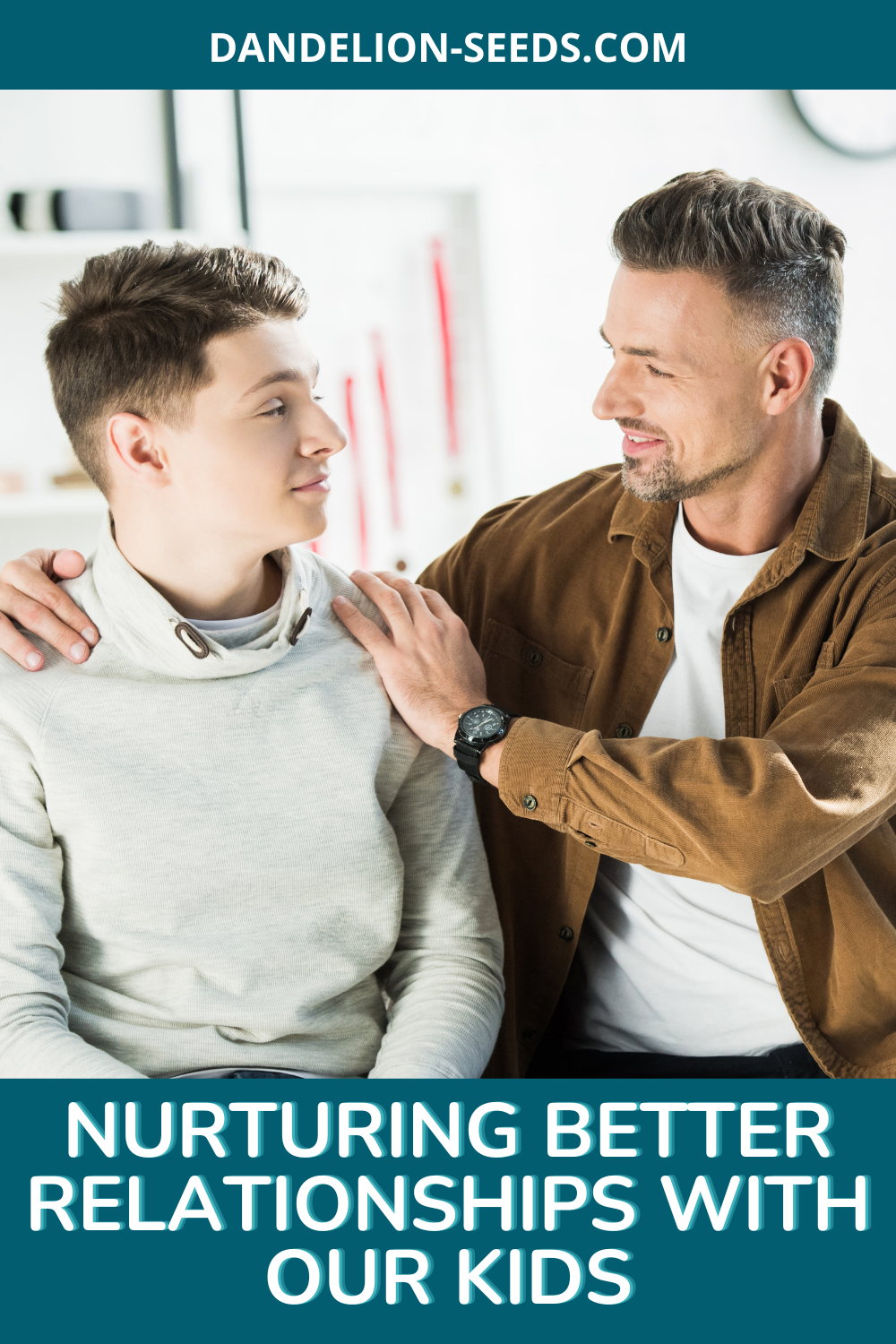
Parenting the older kid -- specifically, teenagers -- really is a different situation entirely from raising younger kids.
Teens are often actively learning the practical aspects of what adulthood will be like, and practicing those skills with you.
Will they be able to negotiate? Push back? Speak up? (Sound familiar? They keep practicing this with you even beyond the early years, to be sure -- because it IS that important.)
Another mindset shift to consider is all our stereotypes about what it means to be a teenager. Are boys really "worse" than girls behaviorally, and is the teen daughter really "more dramatic" than necessary?
Absolutely not. When we explore what's going on for them mentally -- really wonder and get curious about their own perspectives -- we can learn a lot about how to support them during this time of rapid brain growth.
Here, our job is to practice active listening (here's a lovely read about how to do that), and to not be quick to "solve" their dilemmas. Listen first, and ask consent before giving advice. That "lands" much better with the teenager and helps preserve the relationship.
Once we understand our mindset and get curious about our own upbringing, as well as that of our children, we learn that parenting getting easier is less about what our child is doing, and more about how well we're able to meet them with curiosity, compassion, and an open heart.
Every day, parenting is going to get easier. And harder. And back to easier again.
Once I realized this, and accepted that allowing parenting to get easier was about me and not really about my child, helped me accept a new perspective: the "magical age" was when I was a 45-year-old.
It was never about my child; it was about my perspective, and the many things I learned alongside my child. At that point, parenting really did get easier.
When we hear the term "highly sensitive child" (HSC), we may think about an anxious child or an intensely shy child who cries often or is easily overwhelmed. Although sensitive kids may exhibit those traits on occasion, you may be surprised to learn those aren't actually the hallmarks of most highly sensitive kids.
This article will dispel common myths about highly sensitive kids and give parents tools to support their children exactly as they are. I'll share the five important things you need to know later in the article. First, I'll define what sensitive means, and what it doesn't.
To be clear upfront, though, know this: there's nothing "wrong" with high sensitivity. In fact, did you know that sensitive persons may have been instrumental to human survival?
Sensory processing sensitivity [more on this term in a moment] is thought to be one of two strategies that evolved for promoting survival of the species (Aron and Aron 1997; Wolf et al. 2008). By being more responsive to their environments, these more sensitive organisms have an enhanced awareness of opportunities (e.g., food, mates, and alliances) and threats (e.g., predators, loss of status, competitors), and thus may be more ready to respond to emerging situations. (source)
If highly sensitive people are partially to thank for the continuation of human existence, it's time we understand more about them--and help them thrive in today's environment.
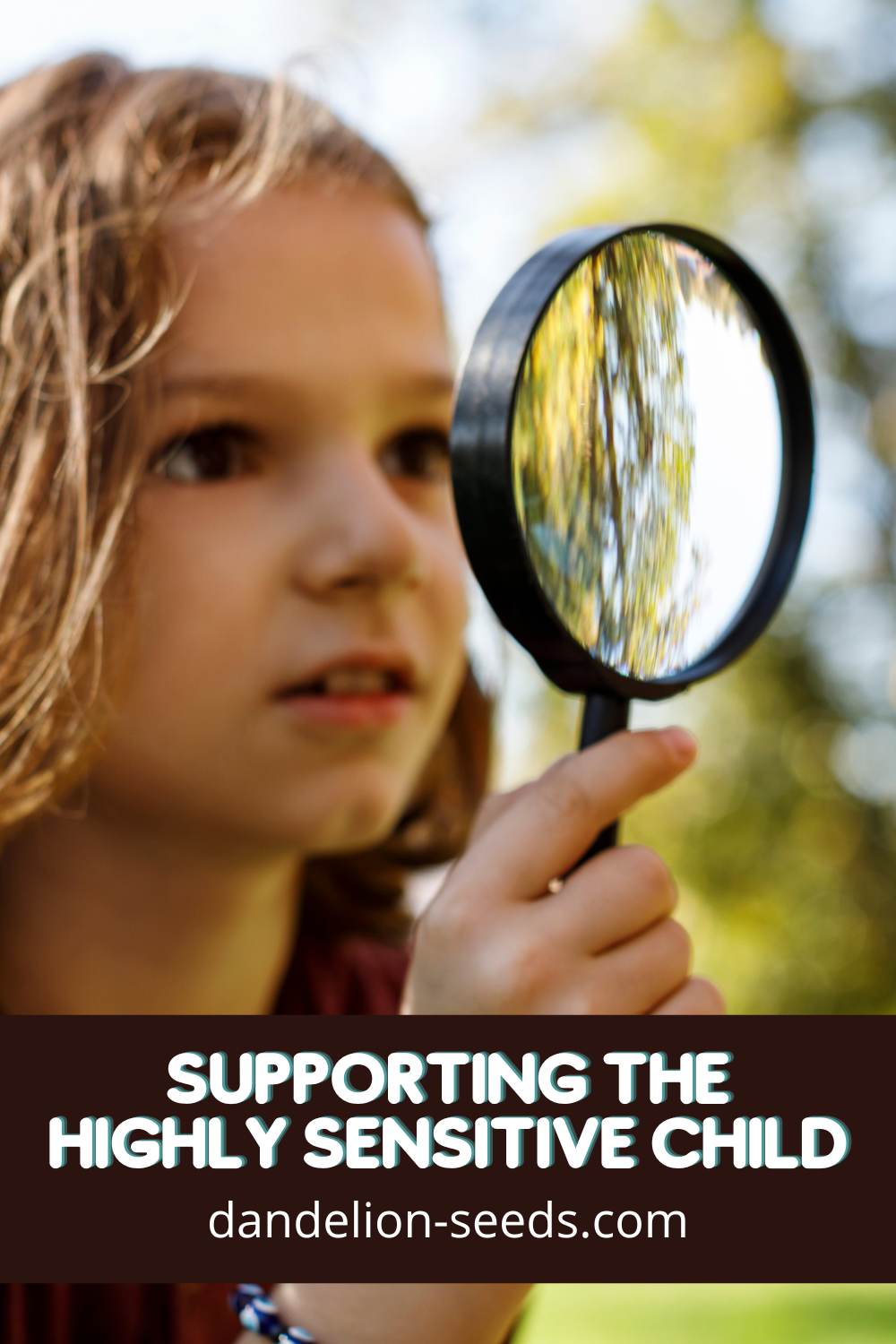
A highly sensitive person (HSP) or, in the case of children, a highly sensitive child (HSC) is:
"...a term coined by clinical psychologist Elaine Aron. According to Aron’s theory, HSPs are a subset of the population who are high in a personality trait known as sensory-processing sensitivity, or SPS. Those with high levels of SPS display increased emotional sensitivity, stronger reactivity to both external and internal stimuli—pain, hunger, light, and noise—and a complex inner life." (source)
In other words, a highly sensitive child may literally experience the world around them differently than others do. They're often more aware of their environment and all that's surrounding them, from the lights in the room to the smells coming from the kitchen and the noises coming from outside. Sensitive people are often hyper aware of their physical surroundings.
Their emotional world may differ from others', too. A highly sensitive child is a deeply feeling child. Big emotions can be overwhelming for many HSCs. It does not mean they're "moody" or "difficult." In fact, highly sensitive people, including sensitive kids, sometimes feel all their emotions extra intensely, including the emotions most people perceive as pleasant, such as joy and gratitude.
Additionally, their self-awareness and empathy may also be greater than others', so they're often caring friends and are deeply loyal to their family members. Their empathy and loyalty can offer them some distinct advantages in friendships and other close relationships (source).
In short, there's nothing at all "wrong" with a highly sensitive child. In fact, they're invariably an exceptional child with traits that, if we take the time to understand how to support them well, we can frame as superpowers.
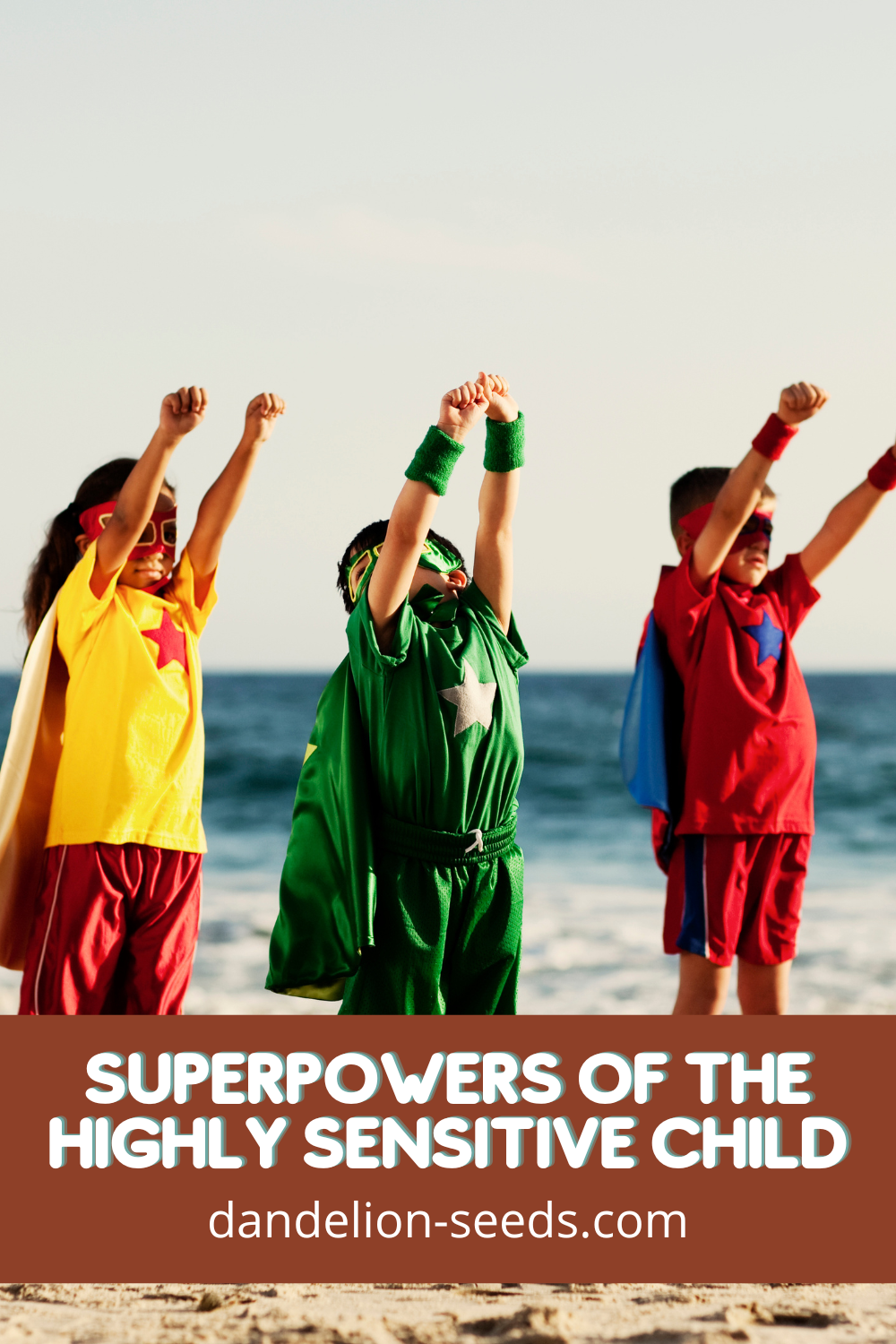
In addition to the empathy and loyalty mentioned above, most HSCs have greater self-awareness than others. They can sense subtle changes in not only their own emotions, but also in those of others. This can be a gift to their families in that they're often highly intuitive and can sense and adapt to the emotional tone of the room. They often come across as "wise beyond their years." This is especially true if they've received consistent emotional support early in life.
With this innate wisdom, they can often be a wonderful support to others. When they care, they care deeply. They may also be mature for their age, having picked up on and learned social cues from adults.
They may be cautious observers, sometimes seeming to hold back from larger groups while they gauge their safety, emotionally and otherwise. They often pay close attention to details, as well as the "big picture" of the world around them.
Many adults may have the sense that highly sensitive children are "wallflowers" or other less-than-flattering synonyms. However, not every highly sensitive child, or "shy" child, is an introvert (source). Perhaps surprisingly, few adults (parents, teachers, or otherwise) realize that 30% of sensitive children are extroverts. An extroverted child may be very outgoing and seem to thrive in busy environments, and still be highly sensitive.
Let's look at how a highly sensitive child who's an extrovert might perceive a situation. Although they might be outgoing and quick to play a game they don't know how to play in the spirit of making a new friend, let's say the other child laughs at them for not knowing the rules.
Although the child might've displayed extroverted characteristics in engaging boldly with someone new, that same outgoing child may deeply feel the insult. They may feel frustrated or hurt longer than some might expect, because the wound may run deeper than it would for some children. Extroverted children need as much emotional support as the child who seems to withdraw or be more introverted.
In addition to not every sensitive child being "slow to warm up," some can be hurt by labels. Mislabeling a highly sensitive child as "shy" can damage their self-esteem.
"...Labelling a child 'shy' means you're talking about who they are as a person, not just their behaviour. Children will often take others' observations seriously, especially those of the people they look up to..." (source)
Additionally, shyness is sometimes misconstrued as social anxiety. It's not.
"...Social anxiety disorder...involves the experience of anxiety and self-critical evaluation in social settings response to the fear of evaluation by others of one’s public performance. It has a greater disruptive influence on one’s social behavior than the experience of shyness..." (source)
Shyness isn't "bad," but as western cultures tend to value extroversion more, the label may prove damaging to the child. (source)

Being a highly sensitive person means little more than having certain temperament traits common to sensitive people. It is not a medical diagnosis, although it can be measured medically:
[SPS] is a temperamental or personality trait involving "an increased sensitivity of the central nervous system and a deeper cognitive processing of physical, social and emotional stimuli". The trait is characterized by 'a tendency to 'pause to check' in novel situations, greater sensitivity to subtle stimuli, and the engagement of deeper cognitive processing strategies for employing coping actions, all of which is driven by heightened emotional reactivity, both positive and negative'. (source)
Interestingly, it is possible to measure greater levels of sensitivity in MRI scans (source). Moreover,
[SPS] is becoming increasingly associated with identifiable genes, behavior, physiological reactions, and patterns of brain activation (Aron et al. 2012). A functionally similar trait—termed responsivity, plasticity, or flexibility (Wolf et al. 2008)—has been observed in over 100 nonhuman species including pumpkinseed sunfish (Wilson et al. 1993), birds (Verbeek et al. 1994), rodents (Koolhaas et al. 1999), and rhesus macaques (Suomi 2006).
Highly sensitive pumpkinseed sunfish. Huh.
High sensitivity is increasingly recognized in the medical community, but it's not a diagnosis and needs no "fixing." Although that's great, we also need to know how this affects our day-to-day life in parenting.
Being a highly sensitive person, whether child or adult, means feeling deeply. The "highs" of life may feel euphoric and joyful; the "lows" may touch on despair. Of course, a highly sensitive person will spend plenty of time in the emotional middle ground, too--but when they're inclined to feel something strongly, it may be amplified as compared with others' emotions.
As such, a highly sensitive child has a nervous system that can be easily overstimulated. They may be prone to expressing big emotions, because their nervous system is literally experiencing them as feeling bigger than those of other people.
Some highly sensitive kids will despise clothing tags, for example, because they find them uncomfortable. A less sensitive person might feel frustrated by what seems like "no big deal," but these kids are literally feeling them differently on their skin.
Not every highly sensitive child will care one whit about clothing tags, however. Each child's development is different, and sensitivity will show up in different ways for different people.
Highly sensitive children do not, by definition, have any "disorder," including attention deficit disorder, and they're not necessarily more anxious than other kids.
Further, they don't grow out of it by a certain age, nor are they "problem children." In fact, many highly sensitive kids are extremely well behaved due to their self-awareness and extremely perceptive understanding of others' experiences.
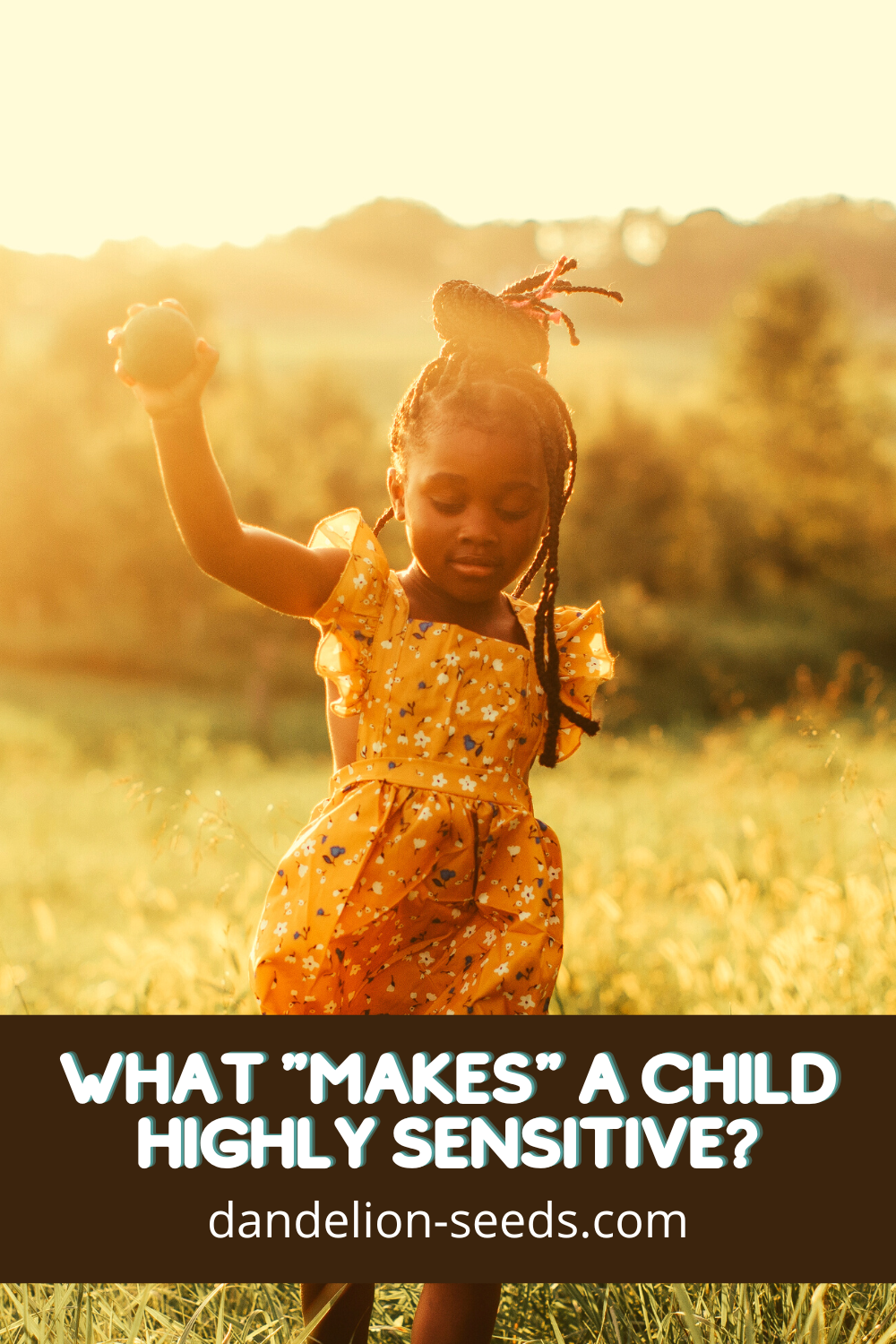
High sensitivity comes from not only the same types of genes that affect other temperament traits, but also the child's environment:
"...genetic factors account for between 20% and 60% of the phenotypic variance in personality, which means that the remaining 80% to 40% of the variance is attributed to environmental factors. Clearly, the environment is very important to temperament." (source)
Does this mean parents "make" their children sensitive? Not necessarily. Environment is important, but genetics play a strong role, too. As an example, let's think about hair. If a blond-haired child spends a lot of time in the sun, their hair is likely to get lighter. Conversely, if they spend more time indoors, their hair isn't likely to lighten much. There's variation within the "blondness" that can be affected by environment.
At the same time, if you put a black-haired child outside, it's highly unlikely that their hair will get substantially lighter. Their genes simply don't allow for that.
When it comes to a highly sensitive child, we can influence their sensitivity through their environment, but we can't give them genes they don't have, nor can we take away the genes they do have.
Highly sensitive children grow up to be highly sensitive adults. How we support and nurture them, however, can help determine how effectively they manage their sensitivity, and whether they see it as a gift or a hinderance.
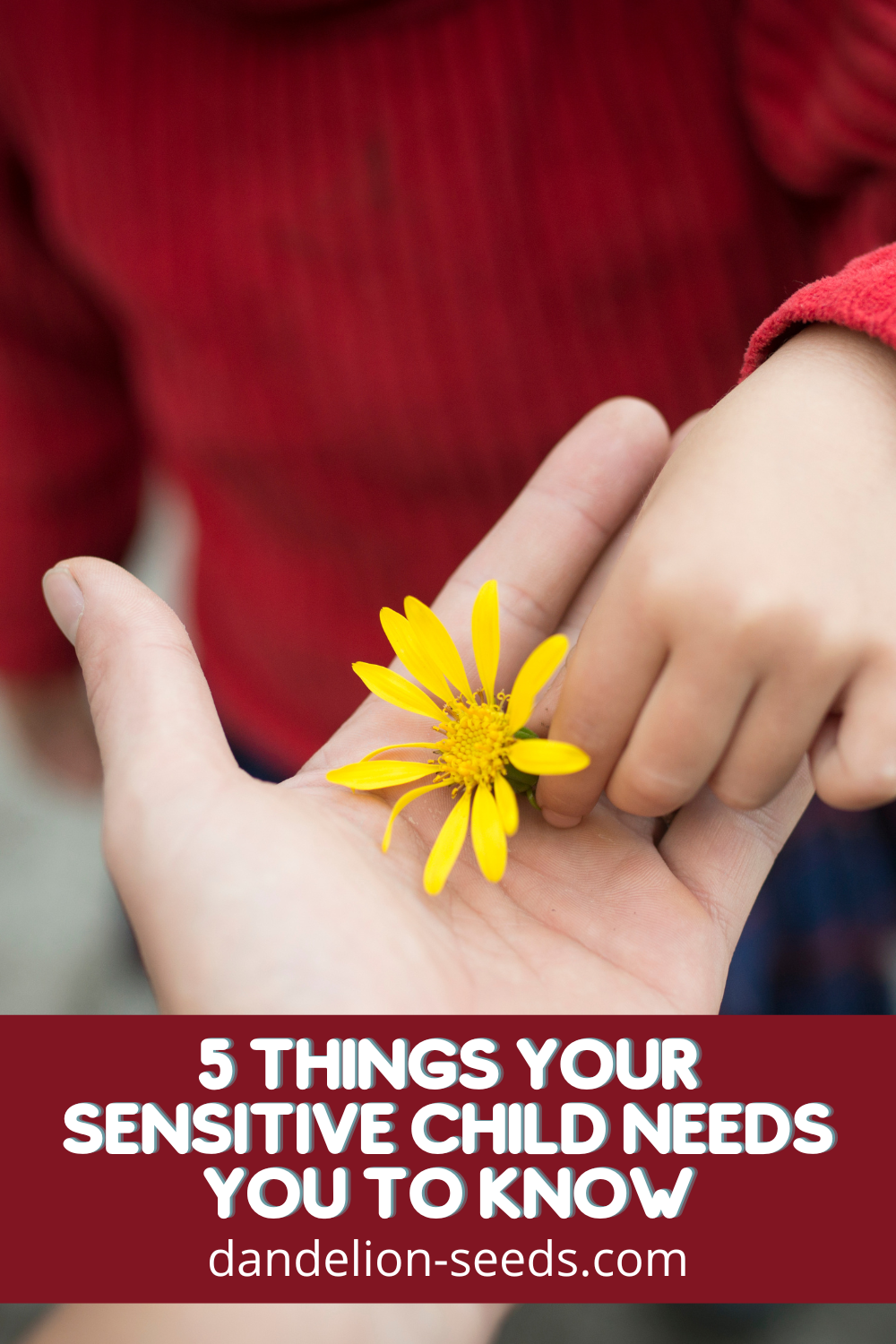
Know that the highly sensitive temperament means the child will experience legitimately more intense emotions than nonsensitive children. Feeling emotionally intense can be both wonderful and difficult; higher "highs," but also lower "lows."
As such, it's helpful to be emotionally attuned to their feelings. Something that might bother other kids only a little, for example, might be truly disturbing to sensitive kids. Check in. Validate what their emotional experience is, rather than projecting your own or assuming all children feel the same way about their experiences.
A toddler was meeting her uncle for the first time. Her uncle, assuming this child was like his own children, attempted to bond with her by startling her with an unexpected "Boo!" The child, however, was more startled than he anticipated, and she burst into tears. She withdrew from him for the rest of their day together, which was the opposite effect of what he'd hoped would happen.
In this example, the uncle could've paused to read the child's body language and see if she was advancing toward him with curiosity and playfulness, or retreating when he got closer, rather than charging at her with the "boo."
Although toddlers aren't developmentally ready to regulate their emotions, we can work with older highly sensitive children on their emotional regulation skills. This is not to say we should stop anyone from feeling their feelings. Quite the contrary.
Instead, we set them up for future success by teaching them what to do with their big emotions. This will help them immensely not only with their day-to-day existence, but it will also help them adapt in new situations as they arise.
Your child will experience their surroundings differently than others will.

If a highly sensitive child is at a birthday party standing next to other children, hearing the same sounds and seeing the same lights, the highly sensitive child may literally experience those sounds and lights as being louder and brighter than the others kids do.
It's important to have a proper understanding of the child's perception; they may simply be highly aware of their surroundings, and therefore, may need more downtime to compensate for all the sensory input.
Be proactive about creating downtime before and after big-to-them events. Your child's nervous system will need the extra support and empathy for everything it's processing all at once. Your child may need more emotional support than some others do, including for some, more physical touch and words of affirmation.
Your tone and emotional authenticity matter. A lot.
Because highly sensitive children are often so in tune with their surroundings, they're likely to notice subtle changes many others might miss.
Let's say you have a challenging day at work. You come home and are happy to see your family, but you've got some lingering stress. The highly sensitive child may pick up on this stress, but because you've only said that you're "fine," they'll pick up on the disconnect between your tone and your words.
Younger children, in particular, may be prone to assuming that you're upset with them, even if it's not true. They simply don't know what else might be bothering you besides their presence, so they internalize the worry and their sense of emotional safety decreases.
Imagine what they're likely to be "reading" in your demeanor. In age-appropriate ways, be transparent about what you're feeling so they don't assume they've caused you to feel upset. Further, you can model for them healthy ways of managing your stress so that they learn how to release their own struggles.
Being authentic also helps the highly sensitive child learn to trust their intuition.
Your child probably wants you to unapologetically advocate for them until they're able to advocate for themselves.
Be aware of their school setting. Teachers understand that different children have different temperaments, and they can be aware that the highly sensitive child may not act quickly or feel emotionally prepared when pushed far out of their comfort zone. Instead, the teacher can help them ease into new situations by talking about them beforehand and showing empathy when kids are slow to warm up to new children, or activities, at school.
If you homeschool or unschool, child-led learning often helps highly sensitive children thrive.Ask for your child's consent to speak with the teacher. If they give it, follow through. This doesn't mean "coddle" the child; it means support them.
You aren't "making" a child be more sensitive by being responsive to their pleas for love and attention. Some family members may erroneously say things like "You're creating a mama's boy" or a "daddy's girl," but those are old clichés that serve no purpose . To the contrary, being responsive to a child's needs helps promote their independence. Responsiveness, along with attunement to a child's emotions and experiences, are proven to nurture secure attachments (source).
Adults in your child's life may pressure you to be tougher on your child to "prepare them for reality."
Remind those adults that we're raising children for the world we want. The gentler we are with children, the more gentleness they'll have to pass on to others as they grow up. Harshness breeds more harshness and disconnection. Kindness begets kindness. We are preparing them for reality if they grow up choosing friends and partners who treat them kindly and respectfully. They won't stand for less.
The most important thing parents and caregivers can do for sensitive kids of any age is to accept them for who they are, without trying to change them or "toughen them up." In fact, if we try to make them tougher, it may backfire--causing them to feel less supported, and more insecure.
A highly sensitive child can be extremely secure in their sense of self, especially when surrounded by adults who celebrate and cherish their sensitivity. In fact, as they grow, they can share their gifts with others. Celebrate and support these kids exactly as they are.